




By Stacy M. Brown
n a 51-48 vote early on July 17, the U.S. Senate approved President Donald Trump’s demand to rescind $9 billion in previously approved federal spending, including $1.1 billion slashed from public broadcasting. The move targets the Corporation for Public Broadcasting (CPB), which funds NPR and PBS and helps sustain more than 1,500 local public radio and television stations nationwide. Only two Republicans, Sens. Susan Collins of Maine and Lisa Murkowski of Alaska, voted against the bill. Sen. Tina Smith (D-Minn.) was hospitalized and did not vote. The House must now approve the bill by Friday to finalize the cuts under the arcane “rescissions” process being used — a rare maneuver that hasn’t suc-

ceeded in decades. The package restores funding for one key program — the President’s Emergency Plan
for AIDS Relief (PEPFAR) — but it leaves public media fully exposed. A last-ditch amendment by Collins and Murkows-
Cop who killed Amir Locke now teaching use-of-force tactics
Community leaders call it a ‘betrayal of public trust’
By Jasmine McBride
Associate Editor
ivil rights attorney and activist Nekima Levy
Armstrong is calling on Minneapolis Mayor Jacob Frey to remove Sgt. Mark Hanneman from any training or leadership role within the police department, after learning the officer who fatally shot 22-year-old Amir Locke in 2022 is now teaching use-of-force tactics to fellow officers. In a scathing open letter sent Tuesday, Levy Armstrong condemned the city’s decision to promote and elevate Hanneman, who killed Locke during a no-knock SWAT raid. The letter called the move “a betrayal of public trust,” “a reopening of deep wounds,” and “a stain” on the mayor’s record. Levy Armstrong wrote,
“What message does it send when the officer who killed Amir Locke is promoted and given power to teach others how to use force?” Locke, a DoorDash delivery driver with no criminal record, was not named in the warrant being served when police entered a downtown apartment on Feb. 2, 2022, where
■ See HANNEMAN on page 5
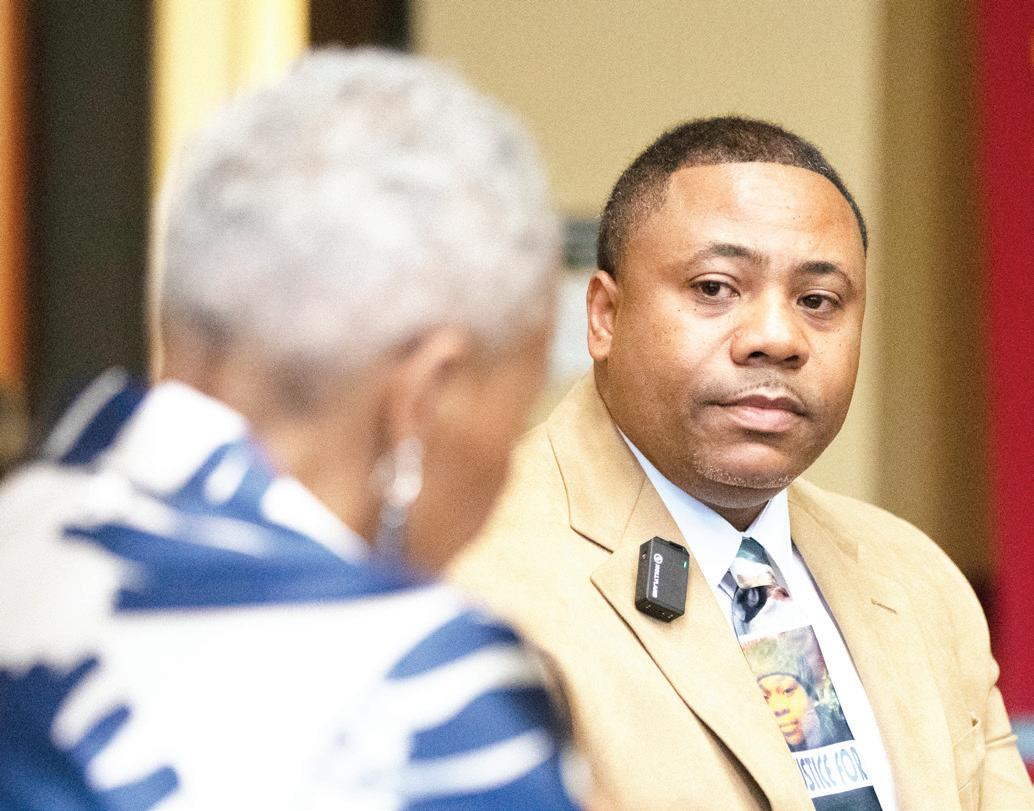
ki to restore most of the CPB funding failed. The White House has labeled NPR and PBS as biased
and “radical,” and the decision to eliminate their funding follows a years-long campaign by Trump and his allies to delegitimize independent news coverage. The administration has portrayed public broadcasting as a partisan operation, a view rejected by both networks and public media advocates.
The cuts would impact federal funding from October 2025 through September 2027, and public media stations are already preparing for layoffs and reduced programming. CPB receives $535 million annually and serves as the financial foundation for stations in rural and underserved communities. Those stations often rely on federal support to operate broadcast towers and cover local news.
“For every public dollar provided, stations raise nearly $7 dollars from donors, including state and local governments, universities, businesses, foundations, and individual viewers and listeners,” CPB has reported.
Without that public dollar, small stations may shut down
entirely. Even larger affiliates are likely to reduce news coverage and cut programming, creating a ripple effect that affects NPR’s national shows, such as “Morning Edition,” and PBS’s children’s programming. Fred Rogers Productions, which produces “Daniel Tiger’s Neighborhood,” is among the nonprofits warning of major disruptions. “If the stations have fewer dollars to spend, then producers will eventually feel the pinch,” the organization said.
NPR told listeners that eliminating federal funding would lead to “fewer programs, less journalism — especially local journalism — and eventually the loss of public radio stations.”
Filmmaker Ken Burns told CBS News, “I couldn’t do any of the films I’ve done without them being on PBS.”
While opponents of public broadcasting argue the model is outdated in the era of streaming and private fundraising, local stations and media executives warn that
demand, we launched the Make Hunger History initiative, which aims to cut hunger in half for all Minnesotans by 2030 by working with partners throughout the state to deliver critical food assistance today and create pathways to economic stability over time. However, the “One Big Beautiful Bill Act” (OBBB), signed into law on July 4, made achieving that worthy goal a lot more challenging.
By Zach Rodvold
econd Harvest Heartland distributed more than 145 million meals to Minnesotans facing hunger last year, setting a new record following years of steady growth in demand for emergency food assistance here and around the country. In the face of this rising
By Jasmine McBride Associate Editor
brought together hundreds to celebrate a community rooted in resilience, culture and connection.
For more than 30 years, Rondo Days has served as a powerful tribute to a once-

matically divided by the construction of Interstate 94 in the 1960s. What remains today is a community dedicated to honoring its history, celebrating its heritage, and envisioning a strong future.
A community divided, and defiant Rondo was once a vibrant, close-knit Black neighborhood spanning several blocks in Saint Paul, Minnesota, known for its rich cultural life and thriving local businesses. That all changed in the mid1960s when city planners chose the Rondo neighborhood as the route for the new Interstate 94 freeway.
The highway sliced through the heart of the community, destroying hundreds of homes and businesses, displacing

Second Harvest Heartland representatives say the “Big Beautiful Bill” supports major food access constraints, especially for communities of color. M-Art Production
thousands of residents, and fracturing generations of families and friendships. The construction of I-94 is widely regarded as a devastating act of systemic racism and urban displacement.
“The freeway came through and destroyed the community,” said Keith Baker, executive director of Reconnect Rondo, ■ See RONDO on page 5

By Jasmine McBride Associate Editor
A fourth-generation Northsider with deep roots in Minnesota’s civic and philanthropic landscape, Chanda Smith Baker will officially become the next president and CEO of the Saint Paul & Minnesota Foundation on Aug. 25.
Smith Baker steps into the role with a career defined by community service, transformational leadership, and an unwavering belief in equity and inclusion. The community foundation, Minnesota’s largest, manages nearly $2 billion in charitable assets and distributes more than 9,000 grants annually across the state.
“I have worked in and for and with community my entire career,” Smith Baker said. “This role feels like a culmination of everything I’ve done. It’s deeply aligned with my values, and I
honestly couldn’t be more excited to lead in this new capacity.”
From her early days running Pillsbury United Communities’ Oak Park center to serving as chief impact officer at the Minneapolis Foundation, Smith Baker has spent decades advancing community-centered philanthropy. She also founded her own consulting firm, Smith Baker, focused on cultivating leadership and driving systems change across sectors.
Throughout her journey she has remained rooted in values of accountability, inclusion and collaboration, principles she says closely align with the Foundation’s mission.
“They were very clear that equity and inclusion are core values,” she said. “Listening to community, allowing community to be the compass, convening across differences — those are values that I lead with, and I’m grateful to be
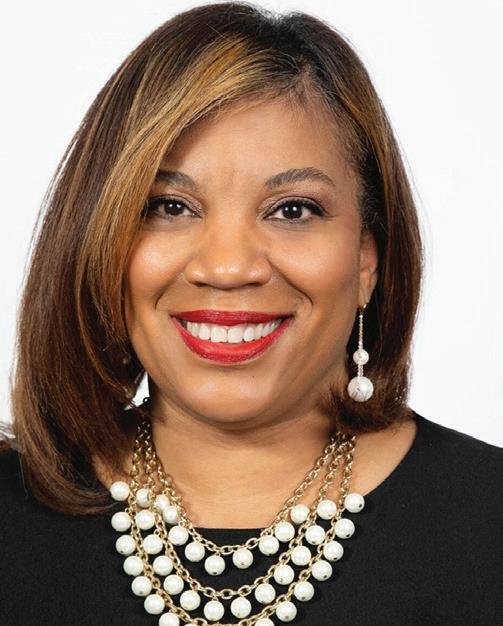
Chanda Smith Baker, new president and CEO of Saint Paul & Minnesota Foundation
Submitted photo
stepping into a space that embraces them.”
Smith Baker’s appointment comes at a time of heightened political tension and shifting public trust in institutions. She acknowledges the weight of the moment, but sees it as an opportunity to model how philanthropy can lead with transpar-
By Jasmine McBride Associate Editor
After more than a decade waking up Twin Cities viewers as a morning news anchor, Dawn Stevens is helping a new generation of creators find their voice, this time from behind the camera.
Stevens and her husband, videographer Landen Stevens, have opened Minnesota Podcast & Content Studio, a professionally designed creative space aimed at making podcasting and high-quality video content more accessible to local entrepreneurs, small business owners and everyday storytellers.
Located at 12351 Champlin Drive, the studio features six customizable sets, top-tier cameras, professional lighting and sound, and on-site engineers who handle the tech, allowing clients to focus solely on delivering their message.
“Our vision was to create a

space where anyone could walk in with an idea and walk out with powerful content they’re proud of,” said Dawn Stevens. “This studio is a place for people to be seen, heard and supported.”
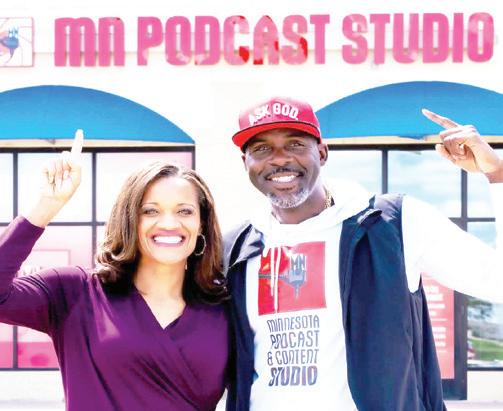
For Stevens, the journey from TV anchor to entrepreneur was rooted in both personal and professional transformation. She moved to Minnesota in 2006 to join Fox 9 as a reporter and spent more than a decade as a familiar face on the station’s morning show.
ency, authenticity and courage.
“There are people living in fear, with disparities becoming more obvious,” she said. “Our responsibility is to demonstrate that we’re about community. That we understand the struggle, and that we are showing up with integrity and relationship.”
Raised in Minneapolis, Smith Baker is a product of generations of civic leadership. Her maternal family has lived in the city for more than a century, and her uncle, Dr. Richard Green, was the first Black superintendent of Minneapolis Public Schools and the namesake of the Green Central neighborhood. Her father’s side came to Minnesota through the Great Migration.
“I’m a Northsider through and through,” she said. “My family has deep roots in Minneapolis and Saint Paul. Leading a statewide community foundation feels like coming full circle.”
out the studio last year, and now it’s a reality.”
Her own leadership journey continues to evolve. Earlier this year, Smith Baker was named a 2025 Bush Fellow; a prestigious honor supporting changemakers across the Midwest. Through the fellowship, she is exploring wellness-centered leadership, developing her storytelling skills, and researching how leaders can better sustain themselves in complex roles.
“Life has a way of converging in unexpected ways,” she said.
“The alignment between the Bush Fellowship and this role was not something I planned, but I couldn’t be more pleased.”
As she prepares to lead the Foundation into its next chapter, Smith Baker credits her own path to being intentional, values-driven, and deeply relational.
“I’ve learned not to chase someone else’s style of leadership,” she said. “Learn yourself. Invest in your development. Borrow inspiration, but make it your own.”
Asked what advice she would offer to young people watching her rise to one of the state’s top philanthropic roles, she paused
and smiled. “Know that there are many ways to lead, and your way is valid,” she said. “Move with integrity. Prioritize relationships. And dream big.”
Smith Baker also shared her appreciation for outgoing CEO Dr. Eric Jolly, the Foundation’s team, and the board who selected her.
“I’m deeply grateful to Dr. Jolly for his visionary leadership over the past decade,” she said. “This foundation has a powerful legacy. I’m honored to be trusted to carry it forward.”
In her down time, Smith Baker says she enjoys reading, traveling, and gathering with friends and family. “Give me a book, give me some good people, and I’m good,” she said with a laugh.
“That’s how I refill my cup so I can show up and lead well.”
For the Saint Paul & Minnesota Foundation’s new strategic plan, or other information, visit www.spmcf.org.
Jasmine McBride welcomes reader responses at jmcbride@ spokesman-reocrder.com.
The studio celebrated its grand opening July 17 with a ribbon-cutting ceremony alongside Champlin city officials, followed by open house hours, live podcast demos, refreshments, and opportunities for local creators to connect.
In Loving Memory
“Waking up at 2 a.m. for over 10 years really impacted my health,” she said, referring to the sacrifices reporters on television make for their careers. “After Covid, I realized I wanted to be more present for my family and healthier overall. I got a communications job working from home, but I missed storytelling, and I knew I still wanted to help people share their stories.”
What started as a personal podcast idea with her husband evolved into something much bigger. “The Lord told my husband that we should help others share their messages too,” Stevens said. “We started building
Sunrise February 4, 1939 - Sunset May 14, 2025
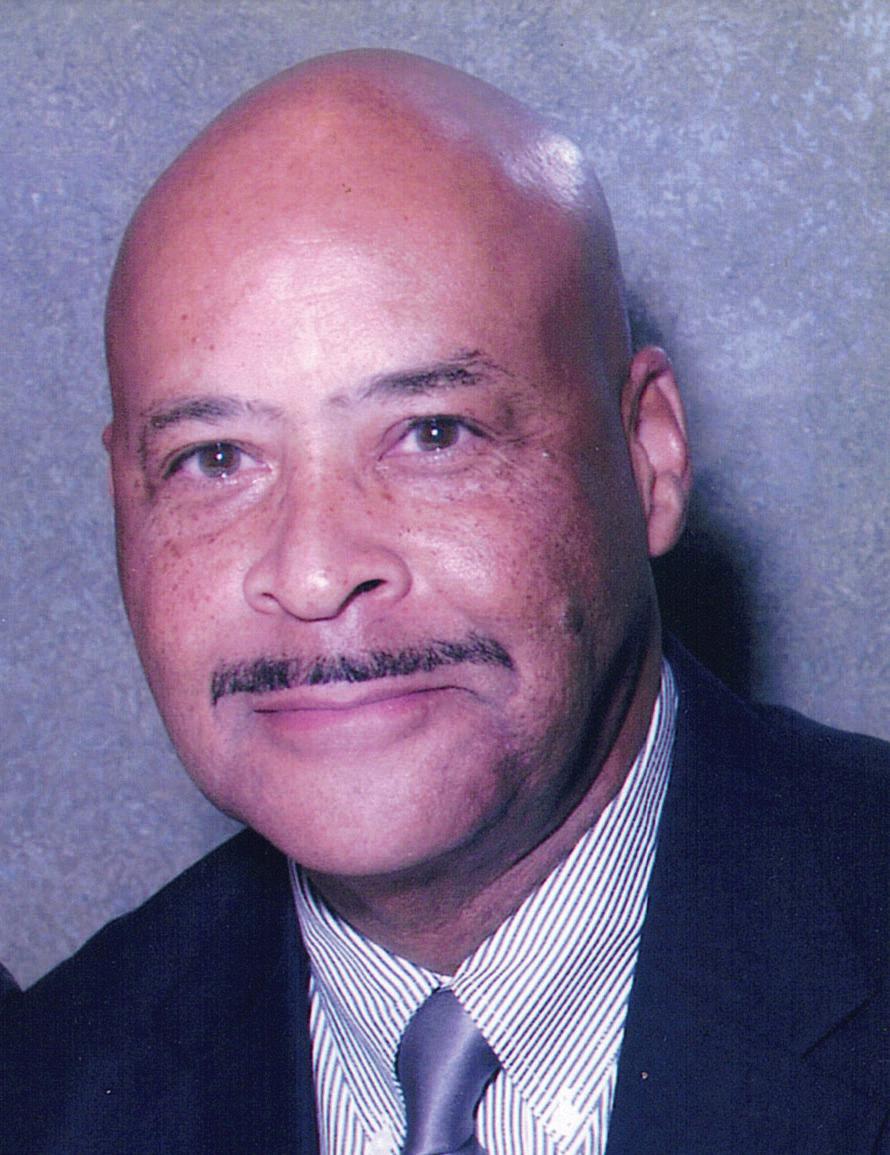
William “Bill” C. Thomas passed away peacefully on May 14, 2025, in St. Paul, Minnesota, at the age of 86. Born in Chicago, he spent much of his professional life in Minnesota — and retired in Lake Havasu City, Arizona.
A leader in human resources and labor relations, Bill served in key roles at Sealy, Honeywell, and the University of Minnesota — where he was associate VP of Human Resources, and Associate VP of Finance and Operations before his retirement in 1989. Known for his fair and pragmatic approach, he was a respected chief negotiator. He was a senior partner at BTW Associates, advising

Fortune 500 companies nationwide. Active in civic life, Bill served as president of the Minnesota State Affirmative Action Association, was a board member at Abbott Northwestern Hospital, and taught at St. Thomas College. He authored articles on management, and wrote passionately about African American history — including the legacy of Black cowboys. In the 1980s, he hosted the NAACP Forum on KSTP-TV.
Bill earned degrees from Crane Junior College and Northeastern Illinois University and completed the PMD program at Harvard Business School. He loved boating, RV travel, fishing, westerns (film), and spending time with family. Bill is remembered for his intellect, humor, and larger-than-life personality.
He is survived by his wife, Joan Marie, son, stepchildren, grandchildren, great-grandchildren, sisters and many extended family members.
A celebration of Bill’s life will be held on Saturday, August 9, 2025, at the Humphrey Institute, 301 19th Avenue South, on the West Bank of the University of Minnesota’s Minneapolis campus, in the Humphrey Forum, Room 105, from 11:00 AM to 1:30 PM (Program will take place at 12:00-12:45 p.m.). Family, friends, and colleagues are warmly invited to honor his memory and legacy.
Memorial donations may be made to the United Negro College Fund (UNCF) in his honor.
The Stevens’ offerings are session-based rather than membership-only. A two-hour session with access to professional video, audio, and customizable sets starts at $300, a price point that reflects the studio’s high production quality and handson support. While it may not be accessible to everyone, Stevens said they’re working to make content creation feel less intimidating and more within reach, particularly for new entrepreneurs and creators looking to build credibility and confidence in their brand.
“Not everyone knows where
to start with content, but we’re here to help guide them,” Stevens said. And while the couple is focused on supporting others, they’re also planning to return to the mic themselves. Stevens confirmed that she and Landen will launch their own podcast before the end of the year.
“We want to inspire people who are stuck in unfulfilling jobs or afraid to leap into entrepreneurship,” she said. “We’ve had those same fears. Our show will be about taking that leap of faith, and featuring guests who can help others navigate that journey.”
While Stevens didn’t release any further info about the podcast, she did mention that many
people don’t realize the behindthe-scenes toll that broadcast journalism can take, a potential hint of what’s to come in this spouse-driven collaboration.
“They just see you on TV, but don’t understand what goes into that life,” she said. “Our podcast will be a way to finally tell our own story, and help others tell theirs, too.”
For more information, visit www. mnpodcaststudio.com or follow @ DawnStevensTV on Instagram and Facebook for live updates.
Jasmine McBride welcomes reader responses at jmcbride@ spokesman-recorder.com.

By Vickie Evans-Nash
Contributing Writer
When diagnosed with Hodgkin’s lymphoma in 2011, Talaya Dendy says she had a great oncologist, health care team, and the support of family and friends.
Still, she lacked the emotional support of someone who truly understood her journey. Now, as a 14-year cancer survivor and 2025 Bush Fellow, she uses her knowledge and experience to support others.
After her diagnosis, her journey began by asking herself why she wanted to live.
“I’m a giver. I love to help people,” she said. “It wasn’t going to be easy, but I knew that I wasn’t going to die.” Understanding what she was facing became key.
“You need to have a general understanding of what it is that you’re facing so that you can start to formulate questions that can help to inform your decisions,” she said.
In 2019, Dendy began her
work as a cancer coach — although the word ‘coach’ never quite felt like the right fit. She found herself drawn to the word ‘doula,’ which typically refers to someone who supports a mother during childbirth.
“In its broadest, most general way of describing a doula, it’s someone who supports another person through a major life change or significant healthrelated experience,” she explained. “We need people to be by our side and walk us through this journey, whether it’s birth or whether it’s cancer.”
She now does this through her organization, On the Other Side.
Most clients find Dendy through a Google search. They begin by filling out a questionnaire about their diagnosis and whether treatment has begun. Next comes a 30-minute virtual meet-and-greet.
Most of her clients live in the U.S., but she has also worked with people in the United King-
dom. If a client lives within 40 to 50 miles of the Twin Cities, Dendy may accompany them to a doctor’s appointment for moral support upon request. However, most of her services are provided virtually.
“It’s more convenient, I’ve found, for people to just get on a Zoom call,” she said. “It’s one less appointment that they have to get dressed for or drive to.”
Her 2025 Bush Fellowship is helping her expand her leadership skills and deepen her approach. She plans to travel to a “blue zone,” areas of the world where people live exceptionally long, healthy lives.
“That could be due to community, due to their nutrition and diet, or due to their lack of hustle culture,” Dendy said. “I want to experience that for myself and bring insights back to my clients.”
She’s especially focused on how nutrition, rest and exercise impact healing. “We’re not really in environments that are conducive to those things,” she said.
By Jasmine McBride Associate Editor
What started as a personal wellness journey during the uncertainty of 2020 has blossomed into one of the Twin Cities’ most uplifting summer events. Now in its fourth
community connection — all for free.
Held at the Hallie Q. Brown Community Center, located at 270 N. Kent Street, the festival offers more than just a good time. It’s a celebration of vitality and self-care rooted in cultural healing and joy.
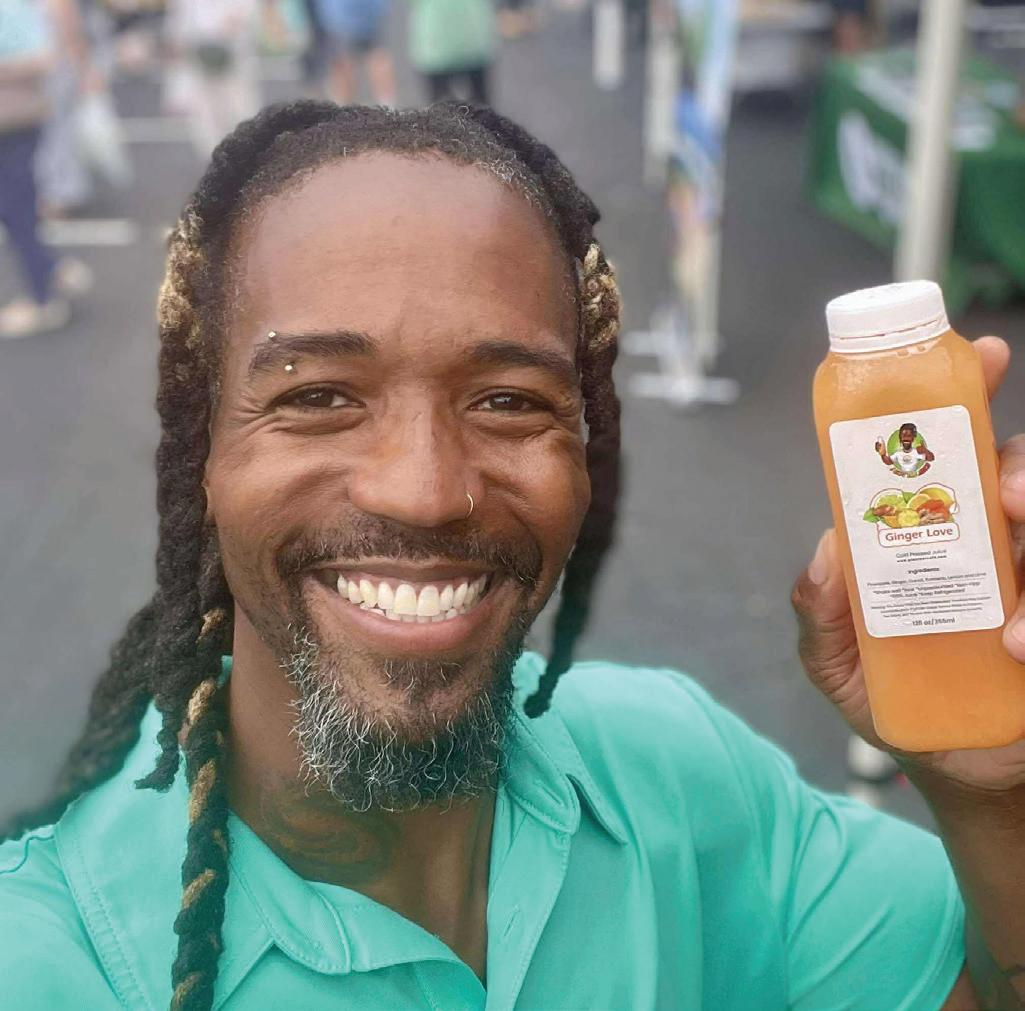
year, V-Fest: The Vibrant Music Health Festival returns to St. Paul on Saturday, July 26, from noon to 6 p.m. It promises a day of live performances, movement, holistic health, and
“V-Fest was started based on my lifestyle in 2020 when I thought I was going to lose my job during Covid and became a personal trainer,” said Phillip McGraw, founder of the festi-

“Most people are working 50 to 60 hours per week. So, their meal is something that you put in a microwave.”
In addition to studying cancer prevention, she plans to pursue certification through the National Board for Health & Wellness Coaching and enroll in leadership development courses.
Dendy is also working to break down barriers to access. Since insurance does not cover her services, it can be difficult for low-income clients to afford the support they need.
She noted that many people of color also remain distrustful of a health care system that has caused harm in both the past and present. “To meet this distrust, it’s important for people to see someone who looks like them,” she said. “I would love to see more Black people in the cancer space and in health and wellness in general.”
To that end, Dendy partners with local organizations committed to increasing community
juice line and pop-up business, Plant Bar Café, as a direct result of his experience organizing the first V-Fest.
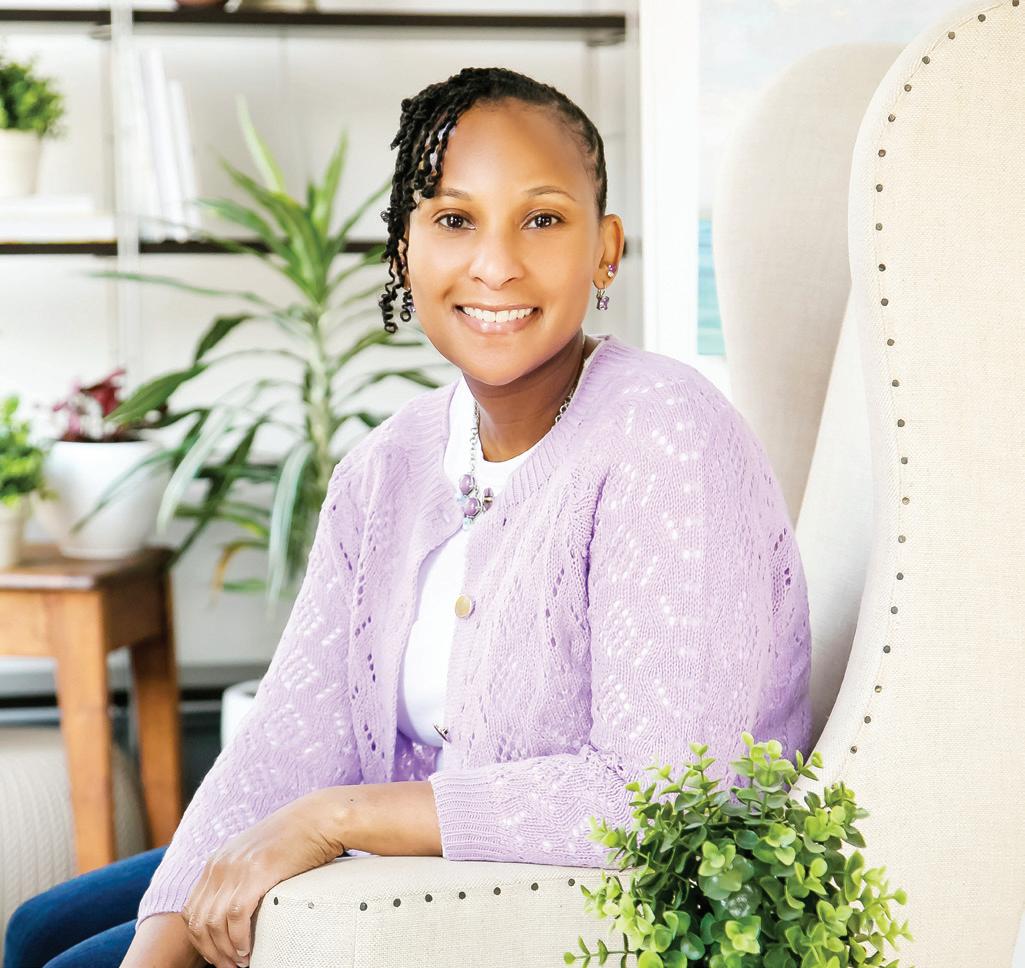
participation in clinical trials. “If Black and African American people are not represented in clinical trials, how do we know that those things are going to work for us?”
She believes clinical trials can be lifesaving and should be considered a standard part of cancer care.
“The Bush Fellowship is all about thinking big and investing in people and their leadership skills,” she said. “It gives us the
flexibility to develop at our own capacity and lead effectively for the long term.”
Find out more about Talaya Dendy and On the Other Side at https://www.ontheotherside.life/.
Vickie Evans-Nash is a contributing writer for the Minnesota Spokesman-Recorder. She welcomes reader responses at vnash@spokesman-recorder.com.
val and the wellness business Living Naturally Abundant. “I wanted to give back. It was important to create spaces of holistic living so people could practice mindfulness, decrease stress, and improve their overall health.”
This year’s event features a robust lineup of eight live music acts, including Se’Anna on the Mic, Madie, Lewiee Blaze, Jandeltha, and Jamela Pettiford.
Hosting duties fall to MC Jiccarra Da “Captain” and DJ Indigo Siren, with a special line dancing session led by Tina.
But behind the vibrant beats is a deeper mission.
“Our intention is to create a space that’s both a concert and a wellness festival,” McGraw said. “It’s centered on care, holistic living, self-love, and community. That’s what makes V-Fest the ultimate community experience in the summer.”
V-Fest includes energizing group workouts, wellness workshops, and a curated list of local business vendors. From decolonized nutrition to breathing practices and food sovereignty, the event is designed to empower and educate.
McGraw, who describes himself as a wellness coach and juicing enthusiast, also launched a
“After the first festival, someone sold me a six-pack of fresh juice. I drank it all in two days and felt a surge of clarity and power,” he recalled. “That changed everything. I knew I wanted to create a product rooted in the same values: wellness, nourishment and community.”
Through Living Naturally Abundant, McGraw now offers
wellness coaching, public speaking, and health-based programming with a focus on addressing disparities and encouraging sustainable living, especially in historically disinvested communities. “I want to normalize breathing, movement and connection as a way of life…not just temporary fixes,” he said. “My goal is to teach people how to ‘live abundant.’”
V-Fest is supported by partners including Ramsey County Public Health, Mississippi Mar-
ket, Hallie Q. Brown Community Center, and Living Naturally Abundant.
“Come join the movement and experience a day of pure vitality, wellness and joy,” organizers shared on the official flyer.
To learn more about the festival or see the full schedule, visit www.vfestmn.com.
Jasmine McBride welcomes reader responses at jmcbride@ spokesman-recorder.com.
Sunrise December 21, 1950 - Sunset July 7, 2025
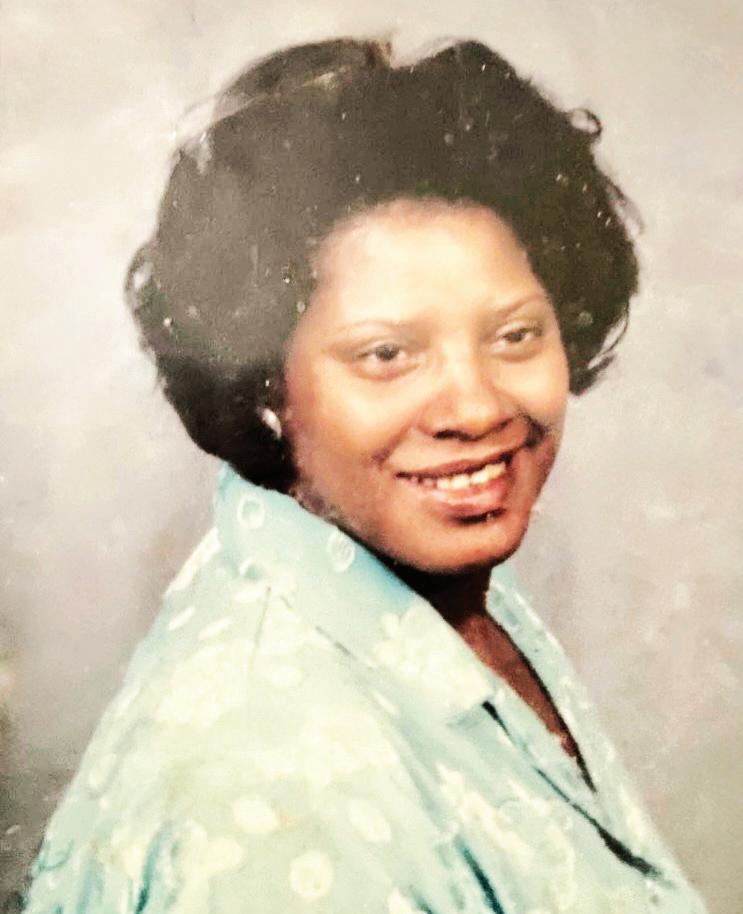
Obituary R

ose Marie Atlas, of North Minneapolis, passed away peacefully on Monday, July 7, 2025, surrounded by her loving family. She was the beloved mother of Andre Atlas, the late Richard Lee Atlas, Natina Atlas-Walker, James Earl Atlas, and Alonzo Atlas. She leaves behind a legacy of love through her 12 grandchildren and 22 great-grandchildren.
Funeral services will be held on Thursday, July 24, 2025, at Open Door Evangelistic World Ministries, 615 E 28th St, Minneapolis, MN 55407. A wake will begin at 11:00 AM, followed by the funeral service at 12:00 PM. All condolences can be sent to the Open Door Evangelistic World Ministries.

By Jasmine McBride Associate Editor
A quiet shift in Minnesota state policy could have major ripple effects for small business owners in North Minneapolis, South Minneapolis, and South St. Paul.
As of July 1, significant changes to the MN PROMISE Act loan program officially went into effect — updates that expand eligibility and increase how much entrepreneurs can borrow to build long-term wealth through commercial real estate ownership.
The PROMISE Act (short for Promoting Redevelopment, Opportunity, Manufacturing, and Innovation in Small Enterprises) was created in the wake of the 2020 uprising following the murder of George Floyd. The program is designed to address the economic fallout and longstanding disinvestment in historically Black and brown communities. By offering low-interest loans for commercial real estate purchases and improvements, the initiative seeks to strengthen business corridors and help entrepreneurs build generational wealth — not just survive. With the latest updates, the program is becoming even more accessible.

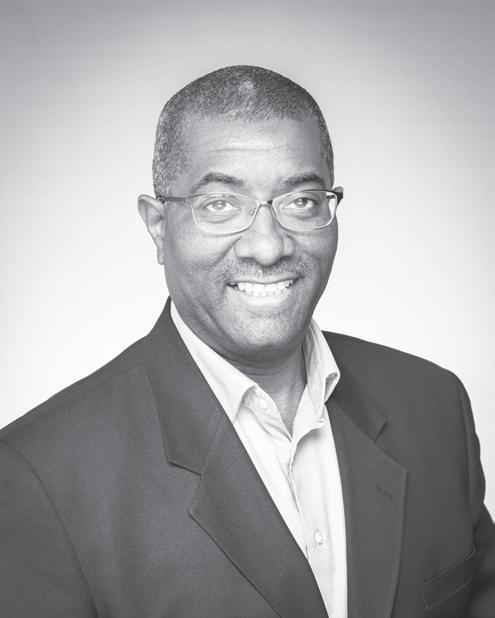
ness owners can now access up to $1.5 million in financing (up from $1 million).
• A higher revenue threshold: Businesses with up to $1.5 million in annual revenue can now qualify.
• More flexibility with paperwork: Applicants can submit any two of their most recent tax returns, not just from 2021 and 2022.
• Debt relief for unfair financing: Businesses stuck in predatory seller-financed contracts can now refinance with a PROMISE Act loan at a 3% interest rate over 10–25 years.
in Minnesota’s business sector. It offers a three-part strategy for supporting BIPOC entrepreneurs: access to capital, technical business consulting, and professional network-building.
“You can’t just give someone a check and expect them to succeed,” Ruddock explained. “We provide coaching on how to operate efficiently, scale sustainably, and connect with key decision-makers and institutions.”
The geographic boundaries of the PROMISE Act are no coincidence. The program prioritizes commercial corridors in North Minneapolis, Lake Street in South Minneapolis, and parts of South St. Paul. These are areas disproportionately impacted by systemic disinvestment, discriminatory lending, and the 2020 civil unrest.
“These are communities that have been overlooked for decades,” Ruddock said. “And we’re here to help level the playing field.”
Historically, entrepreneurs in these neighborhoods have faced steep barriers to entry.
Remaining steadfast
As small businesses across Minnesota navigate inflation, staffing shortages, and political uncertainty, programs like the PROMISE Act serve as a stabilizing force.
“Yes, the national political climate is shaky,” Ruddock acknowledged. “But what we can control is our commitment to these entrepreneurs. With strong fundamentals — capital, technical assistance, and connections — we believe our clients can thrive no matter what.”
New changes and opportunities
According to Adrian Ruddock, vice president of lending and business consulting at the Metropolitan Economic Development Association (MEDA), the PROMISE Act is already having an impact — and the changes will only increase its reach.
“We went to the legislature and asked for these updates because we knew they would make the program more impactful,” Ruddock said in a recent interview. “And they listened.” Key changes include:
• A higher loan cap: Busi-
By Jasmine McBride Associate Editor
When Nadine Ashby began their journey into professional birth work, they quickly noticed something missing. The spaces they trained in were often framed by traditional, exclusive norms that didn’t reflect their identity or the lived experiences of many birthing people they knew. There was little racial diversity, even less queer representation, and virtually no room for ancestral wisdom.
“I saw a gap where there were families looking for support but couldn’t find it,” said Ashby, a Black, queer, nonbinary fullspectrum birth worker. “People would say, ‘I didn’t think I’d be able to find a queer doula, especially a queer doula of color.’
That lit a fire under me.”
That fire sparked The Birth Revolution, a Black-, trans-, and queer-led doula training and consulting organization based in Minneapolis. Founded by Ashby, the collective is rooted in a radical reimagining of care that centers Black, Indigenous, queer, and trans birthing people not as an afterthought, but as the core of its mission.
“We strive to educate students about the injustices facing birthing people, while keeping Black, Indigenous, queer and trans radical joy at the center,” Ashby said.
Building what didn’t exist Ashby, who supports people through pregnancy, postpartum, abortion and loss, didn’t always have the support they now offer others.
“When I was pregnant, I strug-
The updated terms, Ruddock said, are designed to solve a specific problem: Too many entrepreneurs lease their storefronts or operate under unfavorable land contracts, unable to secure the capital or credit to buy property outright.
“Ownership matters,” Ruddock said. “Renting means you’re building someone else’s wealth. Owning means you’re building yours.”
Building equity, not just surviving MEDA, which administers the commercial real estate loan portion of the program, was founded over 50 years ago to address racial and economic disparities
So far, interest has been high — more than 2,000 entrepreneurs have applied to the PROMISE Act program. While only 13 commercial real estate loans have closed to date, a reflection of the complex nature of property deals, MEDA currently has $13 million in active projects in its pipeline. The organization will continue processing applications on a rolling basis through June 2027, or until funding is exhausted.
Ruddock stressed that while commercial real estate deals take time, the long-term return is worth it.
“For many of our clients, this is their first opportunity to stop paying rent and instead invest in themselves,” he said. “It’s lifechanging.”
Leveling the playing field
Traditional lenders often require strong credit, extensive collateral, or high net worth — requirements that shut out many small business owners from ownership opportunities.
“The bank might ask you to put down twice the value of the property just to qualify,” Ruddock said. “That’s just not feasible for the average entrepreneur trying to run a business and support a family.”
By offering low-interest, long-term loans, the PROMISE Act creates an on-ramp to ownership — particularly for business owners operating under seller-financed land contracts, which can carry high interest rates and limited legal protections. Now those contracts can be refinanced through the program, giving business owners full ownership rights, tax benefits, and equity growth.
Ruddock sees MEDA’s work as more than just business development. It’s about economic justice.
“We believe economic development is a communal good,” he said. “We want to create a Minnesota where all entrepreneurs — regardless of race, background, or zip code — have a fair shot at success.”
The PROMISE Act loan program is accepting applications on a rolling basis until June 2027. Entrepreneurs interested in buying or improving commercial property in eligible areas are encouraged to reach out.
For more information, visit www. meda.net or contact MEDA directly to determine eligibility and get connected with a loan consultant.
Jasmine McBride welcomes reader responses at jmcbride@ spokesman-reocrder.com.
gled to find a doula, and to afford one,” they said. “When I finally went into labor, I called the person I’d met with and she said, ‘Who is this?’ That was my sign I was on my own.”
Their care team, they added, wasn’t equipped to hold their full identity or provide affirming, culturally responsive care. “All the advocacy was on me,” Ashby said. “And that was exhausting.”
That experience, of being unseen in one of life’s most vulnerable moments, helped shape the framework behind The Birth Revolution. The organization offers a wide range of personalized trainings and consulting services for birth workers, health professionals, and organizations seeking to dismantle systemic harm in reproductive care.
Topics include:
• Trauma-informed care
• Supporting Black vitality and joy
• Racism as a public health crisis

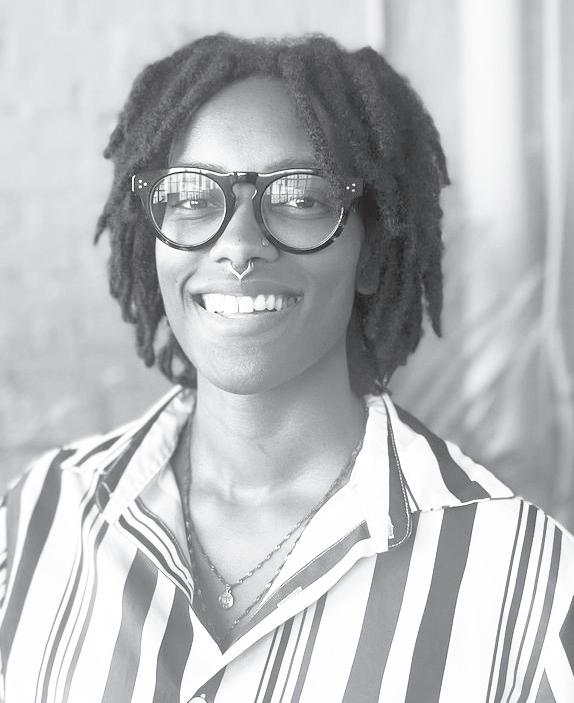
that honor both evidence-based practice and ancestral knowledge — while helping birth workers become more attuned to the cultural and energetic dynamics at play in each client’s experience.
Expanding the definition of safety
Ashby continues to attend births in hospitals, homes, and birthing centers. Each setting, they said, brings its own challenges, particularly for Black clients.
ers, deeper connections, and a reduced power dynamic.
“In your own home, no one’s going to tell you that you can’t eat,” Ashby said. “You do what you need to do to get your baby out, on your own terms.”
Dreaming beyond survival
Ashby hopes The Birth Revolution not only trains new doulas and challenges harmful systems, but also reclaims joy and abundance in birth spaces, particularly for communities too often focused only on survival.
• Inclusive lactation education
• Supporting queer and trans clients
• Navigating fatphobia in birth
• Advocacy in health care
spaces
• Cultural foods and decolonized nutrition
• Dismantling the white savior complex
The goal, Ashby said, is to create brave, affirming spaces
“In hospitals, Black people often hire a doula to shield themselves from racism,” Ashby said. “There’s this feeling of, ‘Let me have someone who can help me survive the system.’ But birth work doesn’t work like that… doulas can’t erase the system’s harm.”
Still, they believe Black people can have beautiful hospital births. It just takes more intention, planning and support. In contrast, home births often provide more time with provid-
“When I ask Black birthing people what they want from their birth, a lot of times the answer is, ‘I just want to survive,’” they said. “And I’m like — that’s it? Let’s dream bigger. Let’s live in abundance up in here.”
To learn more or inquire about trainings, visit thebirthrevolution.org.
Jasmine McBride welcomes reader responses at jmcbride@ spokesman-reocrder.com.

Continued from page 1
the funding is irreplaceable in remote and low-income areas.
Anna Gomez, the lone Democrat on the Republican-
Continued from page 1
he was sleeping on a couch. Within nine seconds of entry, Hanneman fatally shot him.
Attorney General Keith Ellison later declined to file charges in a joint announcement with Hennepin County Attorney Michael Freeman on April 6, 2022, but Locke’s family and many community members have continued to say the killing was unjustified. The appointment has reignited outrage, especially among those directly impacted. Andre Locke, Amir’s father, reflected on his son’s death during a Minnesota Spokes-
Continued from page 1
That’s because, in addition to cutting Medicaid by over $1 trillion, the OBBB cuts SNAP spending by nearly $200 billion over the next decade, the largest-ever cut to the nation’s biggest and most effective anti-hunger program.
In Minnesota alone, SNAP helps around 450,000 people afford groceries by providing, on average, just over $5 per person per day in benefits — money which is spent at food retailers, helping boost local economies throughout the state. In fact, estimates show that for every dollar in SNAP spending, $1.50 or more is generated locally. And yet, instead of working to strengthen SNAP, Congress chose to do just the opposite.
controlled FCC, wrote that the move was not about budgeting but about silencing dissent.
“This isn’t about saving money,” Gomez posted. “It’s about silencing those who report the news accurately, without fear or favor.”
The defunding of public broadcasting, a longstanding goal of libertarian groups and right-wing activists, is now moving closer to reality, with the Senate’s backing and the House on deck. The impact could be felt by millions of Americans who rely on public media not just for news, but for access to culture, education, and civic life.
man-Recorder panel held in May to mark the five-year anniversary of George Floyd’s murder.
“His name wasn’t in your warrant, but his name is going to be in your law book,” Locke said of his son during the MSR-hosted event. “We weren’t prepared for what we were up against. When it all boiled down, I couldn’t teach my son how to survive while being asleep.”
The audience gave Locke a standing ovation after his remarks.
In her letter, Levy Armstrong demanded a full, independent investigation into whether Hanneman or others violated department policy, and called for transparency around his promo-
New SNAP work requirements for adults between the ages of 55 and 64 and families with children over the age of 14 will eliminate or reduce benefits for up to 150,000 Minnesotans in the near term.
On top of that, states will have limited ability to seek exemptions for these work requirements for people facing homelessness or those living in areas of high unemployment, disproportionately affecting Minnesotans of color. What’s more, for the first time ever, the federal government will no longer cover 100% of SNAP benefit costs. Instead, states will pay anywhere between 5-15% of benefits costs going forward, depending on their SNAP error rate (which the USDA defines as unintentional mistakes, not fraud).
Additionally, Minnesota counties will now have to
back someday,” she said. “It was something really big.”
Community ties, cultural pride
an organization dedicated to revitalizing the neighborhood.
“Rondo Days really represents part of that joy, that resurgence, that reunion.”
Legacy of strength and survival
“My name is Shamika Jackson, and I’ve been coming here since I was about 15 years old,” said Jackson, a Minneapolis native. Now 47, she described Rondo Days as a deeply personal tradition.
“[It is] everything to me, what our ancestors went through to have this moment right now.” For Jackson, the event is about more than food, music, or festivities; it’s a way to pay homage to the sacrifices and struggles that made today’s celebration possible.
Keisha Ray, a Saint Paul resident and founder of Keisha Ray Productions, echoed this sentiment. “Rondo Days is like a family reunion,” she said.
“We were displaced by I-94, and this festival is our way of coming back together.” Ray remembers when the event included a parade drawing visitors from across the country.
“I hope they bring the parade
tion and current training responsibilities.
Minneapolis Police Chief Brian O’Hara addressed the controversy in a statement sent to the SpokesmanRecorder on July 18. He acknowledged the community pain caused by Locke’s death and said he was initially concerned when he learned of Hanneman’s training role.
“I gathered facts. I was told that he was an outstanding instructor and a tremendous asset,” O’Hara said.
According to the department, Hanneman began assisting as an instructor prior to 2022. In April of that year, he was assigned to teach Active Bystandership for Law Enforcement (ABLE) and Integrating Communications, As-
shoulder 75% of the cost of administering SNAP, up from 50%, which has led to fears of widespread property tax increases to cover the shortfall.
“Whether you’re contacting state lawmakers in St. Paul or your federal representatives in Washington, DC, now is the time to make your voice heard.”
Meanwhile, the federal government further cuts back on its share of the costs by hindering adjustments to the Thrifty Food Plan, which determines minimum SNAP benefits by calculating the minimum costs of a healthy diet — a change which is projected to cut future benefits by as much as $30 billion,
community. We know the history — how the highway was built and split us up,” he said.
“But we still come together and celebrate.”
Many attendees pointed to the strong sense of community as the heart of Rondo Days.
Friends Sen and Esko, who grew up in Rondo and attended Central High School, described the neighborhood’s legacy as “deep” and “cherished.” “It’s rare these days to find generations appreciating the same thing, but that’s what you see here — commu-
The festival also attracts creatives like Louis “Lewiee Blaze” Edward Michael IV, a local artist and community advocate. He called Rondo “a historically Black, wealthy neighborhood” that has faced gentrification and systemic challenges but remains a symbol of unity and love. “We don’t see that unity much in mainstream media,” he said.
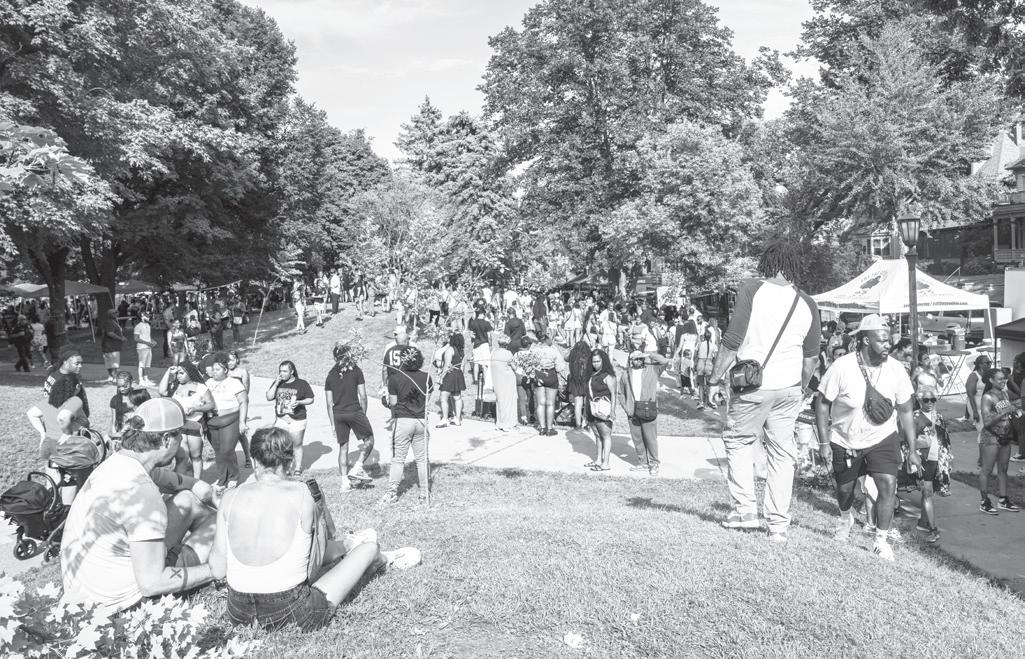
nity, legacy, heritage.”
Darius Winfield came out representing House of Refuge, a church deeply connected to the neighborhood. His family has sold catfish and chicken baskets at Rondo Days for years to raise funds. “Rondo is
“But here in Rondo, it’s all love, solidarity and strength.”
Rebuilding through celebration
Keith Baker explained how Rondo Days plays a role in community healing. “Rondo Days represents joy, resur-
“Like all authoritarians, Donald Trump doesn’t like criticism or objective reporting,” Vermont Democratic Sen. Bernie Sanders asserted.
This piece was originally published in The Washington Informer. For more information, visit www.washingtonreformer.com.
sessment, and Tactics (ICAT). He was promoted to sergeant in September 2022. Since then, MPD says Hanneman helped craft the city’s new use-of-force policy and now leads training based on that curriculum.
“This isn’t about saving money. It’s about silencing those who report the news accurately, without fear or favor.”
this department must change.”
Still, Levy Armstrong, who served as chair of Mayor Frey’s Community Safety Work Group in 2022, said the appointment contradicts the group’s recommendations.
“We deserve a mayor who keeps his word. We deserve a police department that values human life.”
“All of the feedback I have received has been consistent. His performance has been exceptional,” O’Hara said. “He has proven to be deeply committed to the reform process, and our officers see him as a credible messenger about why
affecting all 450,000 SNAP recipients in Minnesota. These cuts could not come at a worse time. As we know from Second Harvest Heartland’s Statewide Hunger Study, one-in-five Minnesota households are already food insecure, meaning they are unable to afford all the groceries they need to feed themselves and their families. Deep disparities are at play as well, with 40% of households of color experiencing food insecurity compared to 16% of white households in our state.
The work group had urged the city to stop assigning officers with histories of harm or controversy to training roles and to partner with external organizations with credibility in de-escalation and community policing.
“The people of Minne -
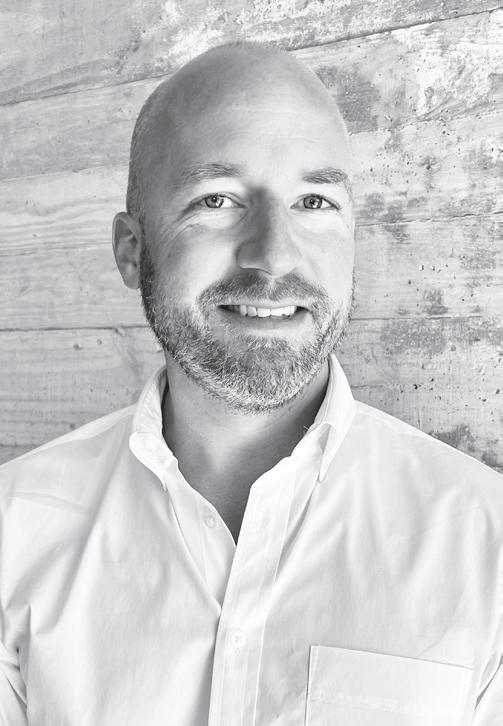
Minnesotans could have an opportunity to advocate for policies to mitigate the steep impacts of these cuts as early as this fall, if state lawmakers in St. Paul hold a so-called “special legislative session” to address the new state budget shortfall created by the OBBB’s deep cuts to SNAP and Medicaid. Additionally, Congressional Republicans intend to propose a so-called “skinny” Farm Bill, which would address nutrition and farming provisions the OBBB did not, including The Emergency Food Assistance Program (TEFAP), which is a
gence and reunion,” he said.
“After Covid paused the celebration, it’s been amazing to see the spirit reignited.”
“We were displaced by I-94, and this festival is our way of coming back together.”
Baker emphasized the power of relationships and laughter during the festival.
“The spirit of Rondo runs deep, and it shows in how people connect here.”
Photographer King Demetrius shared his own perspective. “Rondo Days is peaceful, beautiful, like a family reunion without drama,” he said. “It’s inspiring to see Black men and women stepping up, raising their children, and celebrating together.”
More than a festival
Rondo Days is much more than a day of fun and food. It’s a cultural ritual where African American heritage is honored and community bonds are strengthened. For many, it fills a void left by mainstream holidays that don’t fully recognize Black history and experiences. “Sometimes I feel like I’m
apolis deserve better,” Levy Armstrong wrote. “We deserve a mayor who keeps his word. We deserve a police department that values human life.”
Locke’s father echoed those sentiments in May, stating that the community’s fight for accountability is far from over.
“Justice is right in front of us,” Locke said. “It’s in unity, continuing to have these conversations, and holding our local leaders accountable to their roles.”
Mayor Jacob Frey has not yet responded to a request for comment.
Jasmine McBride welcomes reader responses at jmcbride@ spokesman-recorder.com.
critical source of food for food banks and the food shelves alike.
Whether you’re contacting state lawmakers in St. Paul or your federal representatives in Washington, DC, now is the time to make your voice heard. The more Minnesotans contact their lawmakers to advocate for effective anti-hunger policies, the more they will have to listen. And the more they listen, the more they can do to give families facing hunger a fighting chance — and help cut hunger in half for all Minnesotans by 2030.
Community Voices is a series created to amplify the voices of local organizations committed to dismantling disparities in Minnesota. This contribution is authored by Zach Rodvold, the director of public affairs at Second Harvest Heartland. For more information, visit www.2harvest.org.

A historic Rondo tradition has been the community bike clubs that ride together often in flamboyant gear as a symbol of solidarity and pride.
African without heritage and American without inheritance,” Lewiee Blaze reflected. “Rondo Days is our way of creating our own holiday, our own tradition, filled with love, music, food and life.” The festival’s sights and sounds, from children running and playing to vendors selling crafts, underscore a vibrant culture that refuses to be erased.
Looking forward As Rondo Days 2025 drew to a close, the message was clear: The spirit of Rondo is alive and thriving. It’s a celebration of a community that endured displacement and injustice but continues to build
wealth, culture and connection.
“This is a space where generations come together to honor what was lost and celebrate what remains,” said Keith Baker. “Rondo Days is about resilience, identity, and the power of community.”
For those who attended, from longtime residents to first-time visitors, Rondo Days was a reminder that history lives in every smile, every song, and every shared meal — a powerful testament to the enduring legacy of a neighborhood and its people.
Jasmine McBride welcomes reader responses at jmcbride@ spokesman-recorder.com.

By Markus Flynn
This message is for Black men, mothers of Black men, friends of Black men, colleagues of Black men, and anyone else who claims to care about Black men.
It’s a message we rarely hear, but desperately need to hear: In case no one ever told you this, you should be a teacher.
A year and some change ago, I was on my usual morning commute. I live on the East Side of St. Paul and work downtown. I was headed down Payne Avenue, music up (probably LaRussell), window down, mentally preparing for the day ahead.
I got stopped at a red light and started to zone out. Out of
In case no one ever told you this, you should be a teacher
the corner of my eye, I noticed a man crossing behind my car. He was pushing a small shopping cart, wearing clothes that were torn and inappropriate for the weather. As he turned his head to check for traffic, I saw the profile of his face, and it caught me off guard.
He looked just like me. Similar age. Similar build. Similar skin tone. Similar signature beard. I was stunned. I snapped out of it when the car behind me honked. I kept driving, but I couldn’t shake the image. The rest of my day was filled with questions: What happened in his life? What separated us? What decisions, systems or circumstances landed me in the car and him on the street?
It reminded me of “The Other Wes Moore,” where two men with the same name end up with dramatically different lives. And I wondered: If I weren’t in the car and instead walking past him, would I have said anything? And if I did, what could I possibly say that would be meaningful?
I thought about the most
meaningful decision in my life and boiled it down to one simple message: In case no one ever told you this, you should be a teacher.
Too many Black boys enter school whole and emerge broken, not because of a lack of ability, but because of systemic indifference born from a collective lack of belief in our babies.
In St. Paul Public Schools, less than 20% of Black students were proficient in reading last school year. Fewer than 12% were proficient in math. We have lost, and are actively losing, a generation of Black boys.
Lost because, on the way to school, they’re more likely to see themselves in the person sleeping on the street than in the person leading the classroom.
Lost because, when they arrive, they’re more likely to be seen for sitting silently than for their brilliance.
Lost because their Blackness and maleness come preloaded with the assumption that they will be a disruption, and their experience is shaped accordingly.
Lost because, at this point, being lost has become normalized.

By Francina Carter
Ujamaa Place is working to address systemic racial and economic inequities by supporting young African American men, primarily between the ages of 18 and 30, who face economic disadvantage
and repeated cycles of failure.
The St. Paul-based nonprofit provides access to education, employment, housing stability, and supportive services through a culturally grounded approach that emphasizes personal transformation and self-determination.
From its founding, Ujamaa Place set out to build a multipartnered community of services where participants feel safe, supported and empowered. That intention evolved into the organization’s guiding framework: the Theory of Transformation, a holistic model that helps men realize their potential and become responsible, contributing members of society.
Building a community of change
Ujamaa Place offers far more than a traditional workforce program. Its Theory of

Transformation centers on reducing barriers to economic opportunity through integrated services, tailored coaching, and cultural connection. The model prioritizes outcomes such as stable housing, educational advancement, employment, family reconnection, and eliminating contact with the criminal justice system.



Ken Foxworth
Michael Franks
Lee Friedman
Ella Gates-Mahmoud
Kimerlie Geraci
Erick Goodlow
Leota Goodney
Walter Greason
Karlene Green
Pamela Hall-Clemens
Charles Hallman
Jeana Hamm
Hendon Group, Inc
Thomas Hill
Maxine & Kieran Hughes
That’s why I would tell him to teach. Because who better to show others the way back than those who have been lost themselves?
At Black Men Teach, one of the central messages we live by is: Be who you needed.
So many Black men have never seen themselves in their teachers. In Minnesota, less than half of 1% of all teachers are Black men. Of the roughly 60,000 teachers in the state, fewer than 50 Black men are teaching in elementary schools.
When Black men teach, everyone benefits.
Non-Black students see improved academic and socialemotional outcomes and experience Black men in ways that challenge the narratives they’ve inherited.
Novice non-Black teachers see improvements in their Black students’ math scores and disciplinary incidents when teaching alongside a veteran Black educator.
And Black male students? They gain a mirror. A mentor. A message that they belong.
Black boys with Black male teachers are more likely to be
Curriculum elements include academic support, job readiness, and life skills development. Participants receive assistance
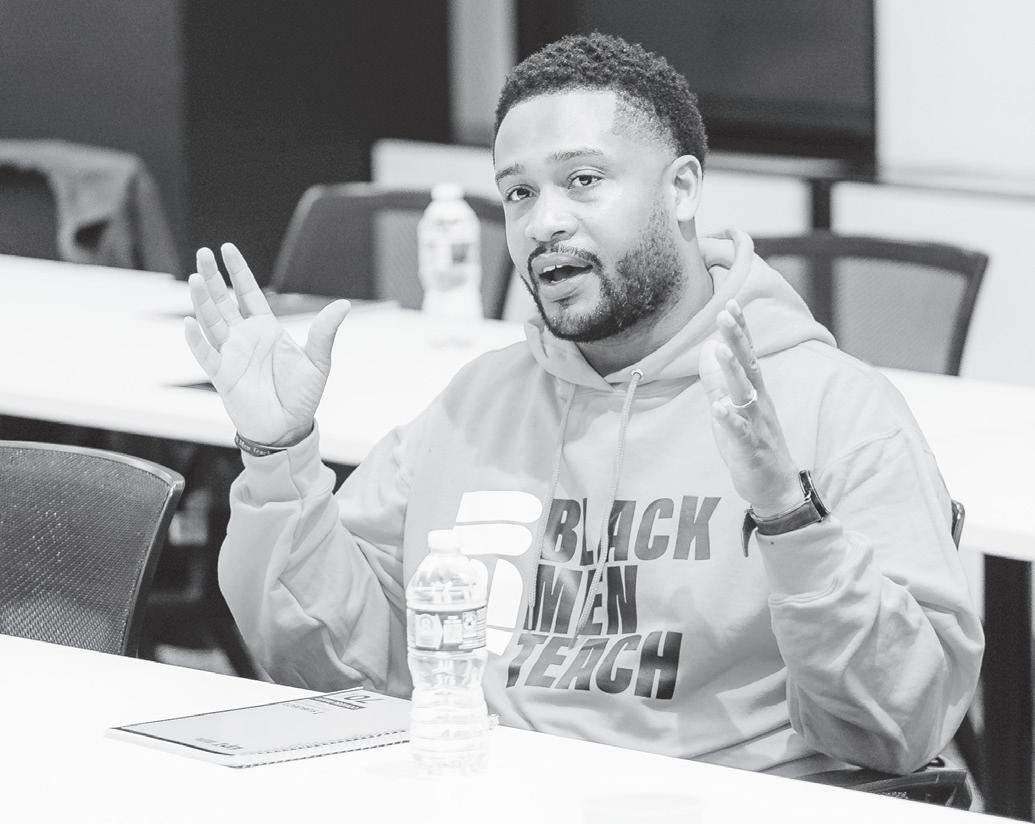
identified for gifted and talented programs, less likely to be suspended or expelled, have better school attendance, are held to higher expectations, are more likely to graduate from high school, aspire to college more, and attend college at higher rates.
For Black boys, no program, policy or practice is more effective in improving outcomes than having a Black male teacher. And yet, so few of them get that opportunity.
So if you’re a Black man reading this, I need you to hear me clearly: The stakes are high. We cannot continue to lose our boys at this rate.
in meeting basic needs, securing permanent housing, and rebuilding relationships with family members and children.
What will happen to a community that cannot read?
Our boys need you. Our community needs you. And in case no one ever told you this, you should be a teacher. Reach out to info@ blackmenteach.org when you’re ready to answer the call.
Markus Flynn, a former classroom teacher, is executive director of Black Men Teach, a Minnesotabased nonprofit headquartered in St. Paul.
Community Voices is a series created to amplify the voices of local organizations committed to dismantling disparities in Minnesota.
Central to the model are highcontext coaching and community-building among men with

Ellen Guettler

By Kanika Cousine
In underserved communities across America, opportunity is not just a path to success but a lifeline. For countless at-risk youth, access to vocational training, stable housing and mentorship can mean the difference between building a future and falling through the cracks.
Many young people enter programs like Job Corps because they already feel discarded. They come from homes marked by instability, foster care, or homelessness — environments that offer few chances and even fewer champions.
for over 25,000 low-income youth. Even systems designed to help them can disappear without warning.
Students were displaced without notice, left scrambling for housing, and disconnected from vital support networks. In New Haven, Connecticut, 149 students lost access to critical services. In Texas, the Gary Job Corps Center, the largest in the nation, shut down, displacing 1,400 students and 500 staff.
For many it was not just the loss of a program. It was the loss of safety, stability, and belief in possibility.
By Mustafa Ali
Let’s not pretend America isn’t fluent in silence. We’ve perfected the art. Generations of whispers have been buried beneath courthouse stairs, inside Black churches burned for daring to breathe, in the hush that follows every time the powerful are caught with blood on their hands and the courts say, “There’s nothing to see here.”
But Ida B. Wells never honored silence. She dragged truth through the front door and nailed it to the front page. She named names. She published evidence. And if she were alive today — watching the shadowy evasions surrounding Donald Trump and the Epstein files — she would not be polite. She’d grab the rotting roots of this hypocrisy and hold them to the light.
She’d start, no doubt, with a question that still slices deep: Whose lives matter enough to seek justice?
Jeffrey Epstein’s crimes were not rumor. They were not internet conspiracy. They were documented patterns — flights, photos, testimonies, names. Girls, many of them underage, many of them vulnerable, trafficked through a network that dressed itself in wealth and power. And now, as the files gather dust and accountability is dissolved in distraction, the question lingers like a stench: Why haven’t we seen the full truth?
Let’s be clear — when Ida documented the lynchings of Black men across the South, she knew what kind of America she was confronting. She
wrote, with fire in her typewriter, that these were not acts of spontaneous violence, but orchestrated spectacles — rituals of control.
The mob didn’t just want blood. They wanted silence from everyone who dared to demand due process or ask questions. And that’s what’s happening again.
Because Trump’s America isn’t just about politics — it’s about power that performs above the law. It’s about a nation where truth is selectively prosecuted and memory is manipulated like currency.
What makes this moment all the more grotesque is how familiar it feels. For centuries, America has built monuments to men while burying their victims. Ida knew this. That’s why she kept records. That’s why she printed the names of sheriffs and mayors, why she risked her life to publish testimonies no one wanted to hear.
She’d publish them. Every name. Every page. Every alias. Every co-conspirator.
And what would she say about Trump? She’d call him what he is: a man who’s spent a lifetime dodging accountability, whether in real estate, elections, insurrections — or, now, the quiet implication that his name may be nestled among the worst of the worst.
For them, Job Corps was never just a program. It was an anchor of hope. It was a second chance they did not believe they would get.
Too often our society tells youth to “stay out of trouble” while offering no roadmap forward. Programs like Job Corps provided a rare and powerful alternative in communities where the school-to-prison pipeline is more visible than the path to higher education or employment. They reminded youth that they are not destined to fail and that something is still worth fighting for.
That is why the abrupt suspension of all 121 Job Corps centers in May 2025 was more than a bureaucratic decision. It was a betrayal. The U.S. Department of Labor cited financial constraints and restructuring goals, but the message was clear
And now we have Epstein — a man whose crimes implicated princes, presidents, billionaires. We have a dead man in a cell, a so-called suicide that reads more like a script. We have a client list that should’ve shaken Washington to its knees. But instead, we get sealed documents, broken chain-of-custody, and a public too exhausted to scream.
Wells would scream. She would not be seduced by partisan spectacle.
She wouldn’t care if the abuser wore red or blue, if they donated to Democrats or dined with Republicans. She would follow the facts. And she’d remind us, again and again, that justice delayed is justice denied.
So what would she do with the Epstein files?

ads@spokesman-recorder.com
submissions@spokesman-recorder.com.
A man who brags of sexual assault on tape and still walks freely through halls of power.
Donald is a man who’s more symptom than anomaly — a reflection of a country that still measures justice on a scale tilted by money, race and fear.
This isn’t just about Trump, of course. It’s about every institution that looked the other way. Every prosecutor who declined to push. Every network that buried the story. Every citizen who decided not to ask, “Why are the victims always expected to forget before the perpetrators are ever named?”
Ida would not forget.
No justice without truth
She would remind us that injustice is not just a crime against the victims — it is a public wound. And the longer we pretend not to see it, the deeper it festers.
She would also remind us that the silence around Epstein is not just about protecting powerful men. It is about what we teach our daughters. It is about what we demand from our press. It is about what kind of country we are willing to be.
Because in the end, the question isn’t just about what happened. It’s why don’t we care enough to find out.
There is no justice without truth. No healing without reckoning.
If Ms. Ida B. Wells were here today, she’d be typing in all caps: UNSEAL THE FILES. NAME THE NAMES. TELL THE DAMN TRUTH.
Because until we do, every flag we wave is just camouflage, and every courtroom oath is just theater. And the silence? That silence becomes complicity.
This piece was originally published in Word in Black. For more information, visit www. wordinblack.com.
By Margaret Kimberly
Donald Trump is perhaps unique among modern presidents in his determination to fulfill his very retrograde vision for the United States. He goes beyond the cajoling and arm twisting that other presidents were known for, and dispenses with precedent, the Congress, and the law itself in order to realize a key part of his vision — getting as many Global South immigrants out of the U.S. as he possibly can.
He was quite serious about enacting a mass deportation policy. Immigrants attempting to follow the law and legalize their status are set upon in courtrooms by masked agents of Immigration and Customs Enforcement (ICE) and are taken to detention facilities.
Farm workers, construction workers and others are also hunted down in the businesses that employ them. Inevitably, U.S. citizens and other legal residents are also snatched up by ICE. The administration is demanding 3,000 arrests per day, an unrealistic number, and consequently, any attempt to reach it is a recipe for abuse and illegal acts.
In New York City, a youth baseball coach intervened when ICE agents questioned children in his charge. In Los Angeles, a phalanx of ICE officers descended on MacArthur Park in a search for new victims.
No warrants are produced, and Tom Homan, the official carrying out the effort, claims that the constitutional right to due process is now null and void.
In Florida, immigrants have been detained in a facility which is literally called Alligator Alcatraz. They are denied contact with family and attorneys and held in unsanitary conditions, served inedible food, and left
This is not just a policy failure.
It is a trauma. When youth are abandoned midstream, without housing, guidance or continuity, it reinforces a dangerous message that they are disposable. That their lives, dreams, and futures do not matter.
These must not be temporary solutions. They should be permanent pillars, protected and supported by the people they serve. We can no longer wait for government systems to remember these youth exist. We need systems that will never forget them.
Please proof, respond with email confirmation to ads@ spokesman-recorder.com
The truth is that these young people already come from systems that have failed them. From underfunded schools to racialized discipline practices, from unstable housing to juvenile detention, the road from the classroom to incarceration is well-worn and difficult to escape.
For many, Job Corps was the first time anyone told them, “You matter. You can build a life.” Losing that is not just unfortunate. It is devastating.
According to the National Center for Education Statistics, over 1.3 million public school students experienced homelessness in the 2020 to 2021 school year. Millions more live unstably, surviving without the scaffolding that helps most young people grow into secure adulthood.
The MSR handles billing digitally. This means you will get e-tears and e-mailed invoices unless you specifically request a hard copy.
These youth do not just need programs. They need commitments. They need community. They need the dignity of stability. Providing youth with training, housing, mentorship and emotional support is not charity. It is justice. And justice, especially for our most vulnerable, must never be conditional. Opportunity must not be a luxury. It is a right we must fiercely protect and intentionally extend to every young person, especially those who have already been left behind.
This piece was originally published in AFRO news. For more information, visit www.afro.com.
If we genuinely care about youth resilience, we cannot keep placing it on the shaky ground of unreliable federal programs. We must invest in community-rooted infrastructure. Local, trusted hubs should offer trade skills, trauma-informed care, housing support, therapy, mentorship, and consistent relationships.
without contact with the outside world.
Governor Ron DeSantis and the Department of Homeland Security play a convenient game of pointing fingers at one another as both avoid accountability regarding conditions in the facility and haven’t relented even as members of Congress condemned its very existence during a recent tour.
Inevitably, a term has reemerged that has come to epitomize the inhumane treatment of marginalized people by those who are more powerful and willing to oppress and exploit them for their own nefarious ends. Suddenly, everyone in opposition to the mass deportation plan is speaking of “concentration camps.”
The cruelty cannot be ignored, and the meaning of this terminology should not become the focus of debate. But there is a danger in practicing U.S. exceptionalism by selectively forgetting that concentration camps are not new in this country.
The U.S. holds 2 million people behind bars, more than any other country, and has led with that dubious distinction for decades. Those people are held in horrendous conditions. In a Virginia prison, men set themselves on fire in a desperate effort to relieve their plight.
Prisoners provide slave labor for states and for corporations. Prisons have no air conditioning in extreme heat and lag in providing medical care. The U.S. also has the most draconian sentences in the world and police forces across the country who kill indiscriminately and keep prisons full of people who are a profit center for others.
Concentration camps existed as Indigenous people were forced from their homes in the Trail of Tears and during other
atrocities. Their lands were stolen to make way for a slavery-based plantation economy, which was replete with conditions such as torture, starvation, and inhumane working conditions that, today, would be akin to those in concentration camps. Japanese Americans were held in camps against their will during World War II. The current moment is one that requires telling the truth about U.S. history. Exceptionalist rhetoric claiming that Trump has brought the nation to a new and unprecedented low point is dangerous nonsense.
The damage Trump has done will outlive his presidency. When he departs, his successor will probably enjoy a political honeymoon, regardless of the actions taken by that person. Relief that the orange man is gone will likely encourage the tendency for wishful thinking and selective amnesia, making the next concentration camp all the more likely to be created.
If people are so upset about governmental cruelty, they can start by dismantling the mass incarceration state that exists throughout the country. That would be excellent preparation for closing down Alligator Alcatraz. But there is little interest in doing so.
There is full support, however, for keeping thousands of other Black and brown people locked away in the carceral state. They exist in the background, and most people in the country want them to stay that way. Outrage is reserved only when the oppression is more visible and is carried out by the villain of the day.
unless objections thereto are filed with the Court (pursuant to Section 524.3-607) and the Court otherwise orders.
Notice is further given that ALL CREDITORS having claims against said estate are required to present the same to said personal representative or to the Probate Court Administrator within four
By:
/s/John Paul J. Gatto John Paul J. Gatto (#0387730) Paul J. Gatto (#33741) ATTORNEYS FOR PLAINTIFFS 1177 West Seventh Street Saint Paul, Minnesota 55102 651-454-3600 jpg@sworgatto.com paulg@sworgatto.com
Minnesota Spokesman-Recorder July 10, 17, 24, 2025
Decatur, Georgia [30033] United States of America. Hunt, Muriel Louise:
C/o 8919 New Falls RD Suite 147 Levittown, Pennsylvania [19054] United States of America.
Sanders, Medina Najah:
C/o 8919 New Falls RD Suite 147 Levittown, Pennsylvania [19054] United States of America.
Sanders, Roosevelt: C/o 3904 North Druid Hills Rd Suite 321 Decatur, Georgia [30033] United States of America.
Sanders, Rasheed-Ahmad:
C/o 3904 North Druid Hills Rd Suite 321 Decatur, Georgia [30033] United States of America.
Sanders, Roosevelt Rasheed: C/o 3904 North Druid Hills Rd Suite 321 Decatur, Georgia [30033] United States of America
By typing my name, I, the undersigned, certify that I am
Continued from page 6
shared lived experiences, with a strong foundation in spirituality, African American identity, and empowerment.
Tailored support
Ujamaa Place serves men facing significant barriers to employment, including homelessness, long-term unemployment, low literacy, and lack of a high school diploma or GED. Participants follow individualized career pathway plans that integrate education,
employment training, and wraparound services. Upon enrollment, each man is paired with a dedicated coach. Together, they develop an Individual Transformation Plan. Participants attend sessions at Ujamaa Place three to four times per week, for two to four hours per day, engaging in group learning and oneon-one coaching.
Education as a key A central goal of Ujamaa Place is to support educational advancement. Each participant is guided through an Education Development Plan and has access to partnerships with educational in-
In Re: Estate of
From Ads Department/MN Spokesman-Recorder PHONE: 612-827-4021
From Ads Department/MN Spokesman-Recorder
STATE OF MINNESOTA FOURTH JUDICIAL COUNTY OF HENNEPIN DISTRICT COURT PROBATE MENTAL HEALTH DIVISION
PHONE: 612-827-4021
From Ads Department/MN
FOR BILLING INQUIRIES & TEARSHEETS
Donna Jean MacDonald, FILE NO. 27-PA-PR-25-1036
Deceased TO ALL INTERESTED PERSONS AND CREDITORS:
PLEASE CONTACT
FOR BILLING INQUIRIES & TEARSHEETS PLEASE CONTACT ACCOUNTING DEPT @ BILLING@SPOKESMAN-RECORDER.COM
Notice is given, that an application for informal probate of the above-named decedent’s last will dated October 7, 2015, has been filed with the Registrar herein, and the application has been granted informally probating such will. Any objections may be filed in the above, and the same will be heard by the Court upon notice of hearing fixed for such purpose.
ACCOUNTING DEPT BILLING@SPOKESMAN-RECORDER.COM
SUMMONS PREPAID FLAT RATE: $110 X 3 WEEK RUN TOTAL: $330
PROBATE 2 WEEK RUN FLAT RATE $215.00 PREPAID
Notice is hereby further given that informal appointment of Bruce M. MacDonald, whose address is 4340 11th Avenue South, Minneapolis, Minnesota 55407, as personal representative of the estate of the above-named decedent, has been made. Any heir, devisee or other interested person may be entitled to appointment as personal representative or may object to the appointment of the personal representative and the personal representative is empowered to fully administer the estate including, after 30 days from the date of issuance of letters, the power to sell, encumber, lease or distribute real estate, unless objections thereto are filed with the Court (pursuant to Section 524.3-607) and the Court otherwise orders.
Please Note: New email address for all future ads is ads@spokesman-recorder.com
Please proof, respond with email confirmation to ads@spokesman-recorder.com
The
The MSR handles billing digitally. This means you will get e-tears and e-mailed invoices unless you specifically request a hard copy.
Notice is further given that ALL CREDITORS having claims against said estate are required to present the same to said personal representative or to the Probate Court Administrator within four months after the date of this notice or said claims will be barred.
Dated: July 15, 2025
ProSe
Yvette M. Andrade Registrar
Sara Gonsalves District Court Administrator
Minnesota Spokesman-Recorder July 24, 31, 2025
In Re: Estate of
Sandra Lea Stoesz, FILE NO.
Deceased
The application of Matthew Dietrich Stoesz dated May 2, 2025 for the informal of the last will and for the informal appointment of personal representative of the above estate came before the Registrar. The Registrar having considered the application determines the following:
1. That the application is complete.
PLEASE CONTACT
2. That the applicant has declared or affirmed that the representations contained in the application are true to the best of applicant’s knowledge or belief.
ACCOUNTING DEPT
3. That the applicant appears from the application to be an interested person as defined by the laws of this State.
Please Note: New email address for all future ads ads@spokesman-recorder.com The MSR handles billing digitally. This means you will get e-tears and e-mailed invoices unless you specifically request a hard copy.

ASSUMED NAME FLAT RATE $215.00 2 WEEK RUN
4. That on the basis of the statements in the application, jurisdiction of this estate, proceeding and subject matter is proper.
5. That on the basis of the statements in the application, venue is proper.
6. That the original, duly executed and apparently unrevoked last will of the decedent is in the Registrar’s possession, and that the will to which the requested appointment relates will be informally probated upon entry of this order.
Please proof, respond with email confirmation to ads@spokesman-recorder.com
7. That any notice as required by the laws of this State has been given.
8. That the application does not indicate the existence of a possible unrevoked testamentary instrument which may relate to property subject to the laws of this State, and which is not filed for probate in this Court.
9. That it appears from the application that the proceeding was commenced within the time limitation prescribed by the laws of this State.
10. That from the statements in the application, the person whose appointment is sought has priority entitling appointment, and is not disqualified to serve as a personal representative of the decedent.
11. That the application does not indicates that a personal representative has been appointed in this or another County of this State whose appointment has not been terminated.
12. That the decedent died on December 4, 2024 and at least 120 hours have elapsed since the decedent’s death.
13. That the heirs are as stated in the application.
14. That the application is approved in accordance with Rule 11.01 of the Minnesota Rules of Civil Procedure.
Now, therefore, it is ORDERED by the Registrar as follows:
1. That the application is granted.
2. That the decedent’s last will, duly executed on February 5, 1996 is informally probated.
3. That Matthew Dietrich Stoesz is informally appointed personal representative of the above estate, with no bond, in an unsupervised administration.
4. That upon qualification and acceptance, letters of administration issue accordingly.
stitutions, including Saint Paul College, that offer GED prep, college-level coursework, and apprenticeship pathways.
Educational services include counseling, tutoring, TABE (Test of Adult Basic Education) testing, and postsecondary credentialing. Education and employment programming are offered concurrently and aligned with Minnesota’s high-demand career fields, helping men move into jobs with family-sustaining wages.
Employment preparation, placement
Ujamaa Place also emphasizes job readiness and place-
ment. Programming includes resume development, mock interviews, and job search support. In addition, participants are trained in soft skills such as professionalism, teamwork, time management and communication.
To build long-term financial stability, men also complete courses in financial literacy, banking, investment, and computer skills. The organization offers four-month internship placements with local employers at no cost to businesses, making Ujamaa men valuable assets to the community.
Partnerships, wraparound services
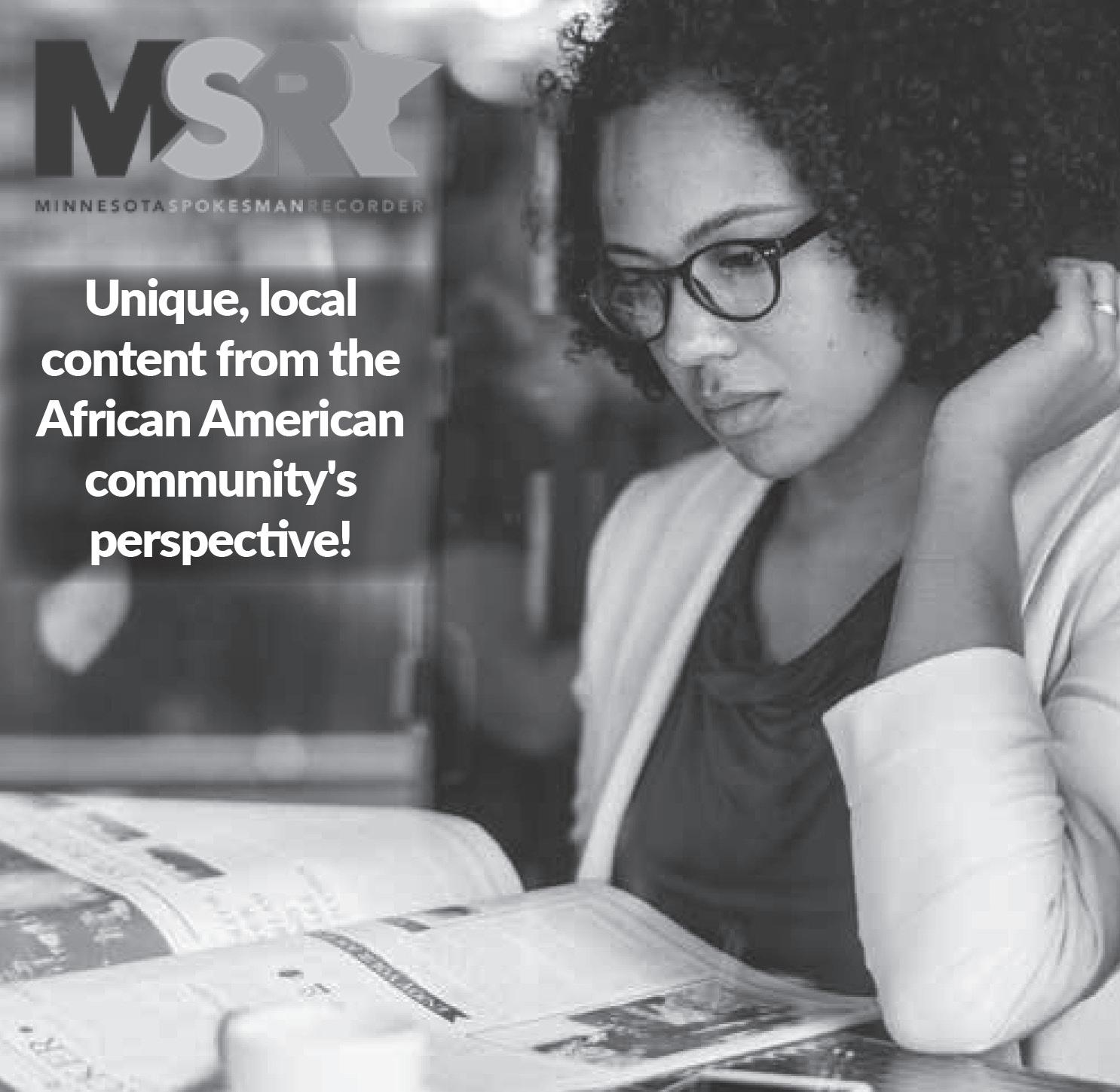


Ujamaa Place works closely with community-based organizations to align services and meet participants’ complex needs. The nonprofit provides navigation and supportive services that break down barriers to employment and promote success across the career development continuum.
In recent years, Ujamaa Place has expanded its programming to offer more intensive financial literacy sessions, personalized education support, and post-secondary scholarships.
A proven pathway forward By stabilizing employment and expanding access to edu-
cation, Ujamaa Place is helping to dismantle systemic inequities that have long marginalized African American men in the Twin Cities. Through community, coaching, and culturally relevant programming, the organization is not just transforming lives, it’s helping build a more equitable future for all.
Francina Carter is the advancement associate at Ujamaa Place. For more information, visit www.ujamaaplace.org.
From Ads Department/MN Spokesman-Recorder
Senior Software Engineer II US, Perforce Software Inc.,
Remote - US. Req. Bachelors or foreign equiv. in Comp. Sci. or rel. technical fld, & 3 yrs of exp. as a SoftwareEng. or a rel. computer occupation. Salary: $103,605 - $168,024. For confidential consideration, apply at https://www.perforce.com/careers.
No agencies or phone calls please.
ASSUMED NAME FLAT RATE $215.00 2 WEEK RUN
Sr. Software Engineer III
US, Perforce Software, Inc.,
Please proof, respond with email confirmation to ads@spokesman-recorder.com
Remote - US. Req. Bachelors or foreign equiv. in Comp. Eng., Comp. Sci., Electronics & Comms. Eng., or a rel. fld, & 5 yrs progressive post-bacc. exp. as an Engineer or rel. occupation. Salary:
$141,898 - $167,016/yr. For confidential consideration, apply at https://www.perforce.com/careers.
No agencies or phone calls.
Continued from page 10
assistant and then in player development, before landing as a full-time assistant coach in 2023. “One, it gives me a chance to see if I ever could or want to be a [NBA] head coach. But just like the players, it allows you to step out and be a little uncomfortable.”
Wade is a longtime veteran coach — he was the third Black male to win a WNBA championship (Chicago, 2021) and was a Minnesota Lynx assistant on
Continued from page 10
Idaho. “It was there where I really found opportunities.
As a journalism major, I’ve been offered a lot of opportunities.
“Once I realized I wanted to work in sports, I went head-on into any and everything,” she said, including an internship last summer with the NBA’s Los Angeles Lakers. “That was my first corporate internship,” which included working in the team’s business operations.
“Being at a big company like the Lakers, I am confident in my abilities,” she added. Her latest internship included working with the players as a media liaison.
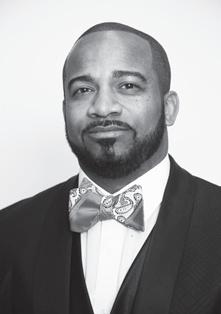
Website: www.greatfriend.org
Email: info@greatfriend.org
“It is extremely important. It allows you to step out and be a little uncomfortable.”
their 2017 championship club. He joined the Toronto staff in 2023. “I couldn’t have been in a better situation,” concluded the Raptors assistant coach.
“I feel we’re building something… I love being a part of it.”
Charles Hallman welcomes reader comments to challman@ spokesman-recorder.com.
“I’m super blessed and super thankful. Right now, I am working with the communications team and job shadowing my manager. She showed me the ropes.”
It is especially important for her as a Black woman to be involved with a majorityBlack-led league, stated Robertson. “It means everything,” she said proudly. “I was born and raised in Boise, Idaho. Growing up there, you do not see Black women at all.
“The representation of seeing me in something like this gives them hope, especially being the only one in college from both sides of my family, being a first-generation Liberian [college] student. It means the most.”
WNBA Commissioner Cathy Engelbert last week told the MSR that she had planned to meet with the
Continued from page 10
huge responsibility to make a transformational CBA not
only for our generation now but the next generation that will come into this league.”
Charles Hallman welcomes reader comments to challman@ spokesman-recorder.com.

HBCU students at halftime of last Saturday’s WASG for their feedback. “It was a great idea, and we will build on it for the future,” she stressed.
“This is a huge tentpole event for us. I believe these HBCU [students] will be experts at a tentpole event” after working All-Star Weekend, added Engelbert.
Robertson surmised that the WNBA internship gives her more skills as she returns to college to finish up her degree work and hopefully embark upon a sports journalism career. “Being able to have that experience and take it with me to Howard and beyond to build my brand as an up-and-coming sports journalist, it’s amazing.”
Loving the game
Jhanae Brady drove 12 hours from the D.C. area to
attend last weekend’s AllStar festivities. “This is my first All-Star Game, but I’ve been a season ticket holder for Indiana, Atlanta and Washington,” admitted Brady as we walked together from the arena to her car after Friday’s All-Star events.
“I love the game,” she said. “When it comes to the purest form of the game, I think that’s what women’s basketball brings.”
Brady also expressed concern about the growing divisiveness that currently surrounds the WNBA: “I think it’s disconcerting that people are taking sides. It’s all about the game. If you love the game, you’ll see the spirit of competition and respect.”
Charles Hallman welcomes reader comments to challman@ spokesman-recorder.com.
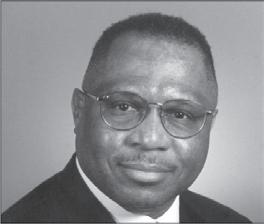
Rev. Arthur Agnew, Pastor
“Winning the World with Love”
Pilgrim Baptist Church
Rev. Doctor Charles Gill
732 W. Central Ave., St. Paul, MN 55104
Sunday Worship Service: 9:45 am Sunday School: 8:45 AM

Advertise your weekly service, directory or listing! C ALL: 612-827- 4021
Sr. Program Manager Corporate Development Medtronic, Inc.,
From Ads Department/MN Spokesman-Recorder
Phone: 612-827-4021
Reporting to its facilities located in Minneapolis, MN. Duties: Operates with limited supervision as the primary contact for Corporate Development leading critical aspects of mergers and acquisitions, joint ventures, minority investments, and divestitures. Requirements: Travel required: 40%, Global, Conduct due diligence on the target companies; business meetings. Salary: $204,700 to $246,000 per year. To apply, visit https://medtronic.wd1.myworkdayjobs.com/MedtronicCareers/, select Req. R38010. Medtronic is an equal opportunity employer committed to cultural diversity in the workplace. All individuals are encouraged to apply.
FOR BILLING INQUIRIES & TEARSHEETS
PLEASE CONTACT
ACCOUNTING DEPT
BILLING@SPOKESMAN-RECRDER.COM
From Ads Department/MN Spokesman-Recorder
No agencies or phone calls please.
EMPLOYMENT DISPLAY
Phone: 612-827-4021
SIZE: 2COL X 2 INCH
Transportation, Design Engineer WSB LLC, Burnsville, MN, Req. Bachelors in Civil Engr or related engr degree, plus 3 yrs exp as Transportation Engr or related in transportation engr. Must possess MN Professional Engineer license, or able to obtain w/in 6 months of hire. In office work w/ flexibilit to work from home up to 2 days/wk.
RATE: $44.60 PER COL. INCH TOTAL: $178.40
FOR BILLING INQUIRIES & TEARSHEETS
PLEASE CONTACT
ACCOUNTING DEPT
BILLING@SPOKESMAN-RECRDER.COM
Please proof, respond with email comfirmation to ads@spokesman-recorder.com. For more exposure: We are also inviting our clients to advertise on our website for 2 weeks for a flat fee of $150 per position with the purchase of print ad
No agencies or phone calls please.
EMPLOYMENT DISPLAY SIZE: 2COL X 2 INCH
RATE: $44.60 PER COL. INCH
TOTAL: $178.40
The MSR handles billing digitally. This means you will get e-tears and emailed invoices unless you specifically request a hard copy.
Continued from page 10
Please proof, respond with email comfirmation to ads@spokesman-recorder.com
job as a sports reporter for Insight News. As a 21-yearold fresh out of college, I was excited to learn that my father Kwame McDonald had arranged an interview for myself with Winfield after his speech.
The MSR handles billing digitally. This means you will get e-tears and emailed invoices unless you specifically request a hard copy.
Imagine, my first interview with arguably the greatest overall athlete to ever come out of St. Paul and, even more importantly, from the city’s Rondo community.
After Winfield’s speech, an aggressive group of media --- blocking me out ---swarmed him immediately for questions and comments. My head sank as I was concluding that my interview was not going to happen.
That quickly changed thanks to Winfield. “I will answer any questions you have for me,” he said in a soft-spoken manner. Then, pointing at me, he continued.
“But I promised an interview to this young reporter right here, so I will talk to you all when we’re finished.”
We went to a private area and had our conversation. To say I was on cloud nine is an understatement. It remains one of the top highlights of my journalism career. I don’t remember what I wrote or what was said during the interview, but what I will never forget is the kindness and recognition
To say I was on cloud nine is an understatement. It remains one of the top highlights of my journalism career.
a 21-year-old reporter received from a professional athlete and St. Paul icon, who at the time was on his way to being one of the alltime greats.
Remember it like it was yesterday!
To see MSR’s collage of this impactful event, visit www. spokesman-recorder.com/ category/photo-galleries/
Dr. Mitchell Palmer McDonald welcomes reader comments to mcdeezy05@gmail.com.

AS VEGAS — The wellworn tag line around here “What happens in Vegas stays in Vegas” certainly doesn’t apply here in regards to the NBA Summer League, which ended its 10-day run last week.
All 30 NBA teams competed in Vegas with rosters mostly composed of rookies, first-and-second year veterans, and others all vying for final roster spots when the 2025-26 season begins this fall. Some are certain locks, while others are clamoring for serious consideration by the respective teams’ coaches.
Three native Minnesotans were among those who competed on teams the last couple of weeks in Las Vegas: Dawson Garcia (Detroit), Curtis Jones (Denver), and Jamison Battle (Toronto). Only Battle, who spent time both with the Raptors and their G
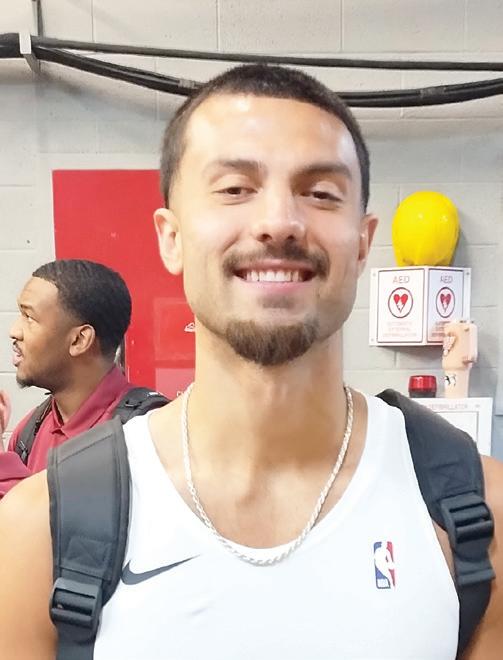
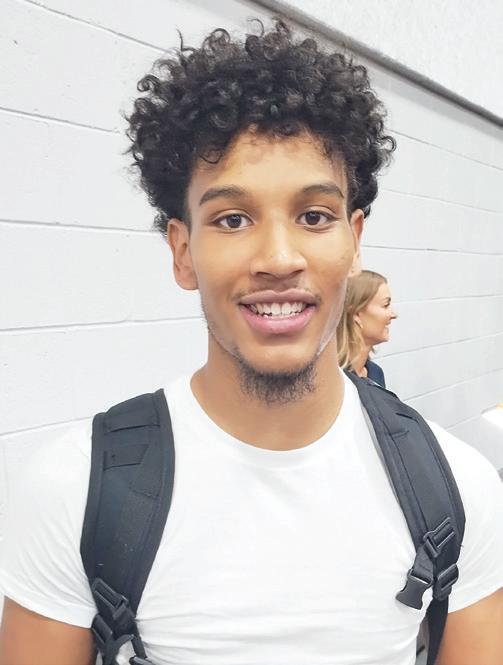
League affiliate as a two-way player last season, have NBA experience, while both Garcia and Jones are rookies. Battle, a Minneapolis De La Salle graduate, played his college ball at George Washington (2019-21), Minnesota (2021-23), and Ohio State (2023-24). The 6’6” small forward told me after a contest that although he’s among seven veterans on the Raptors Summer League squad, he isn’t taking anything for granted.
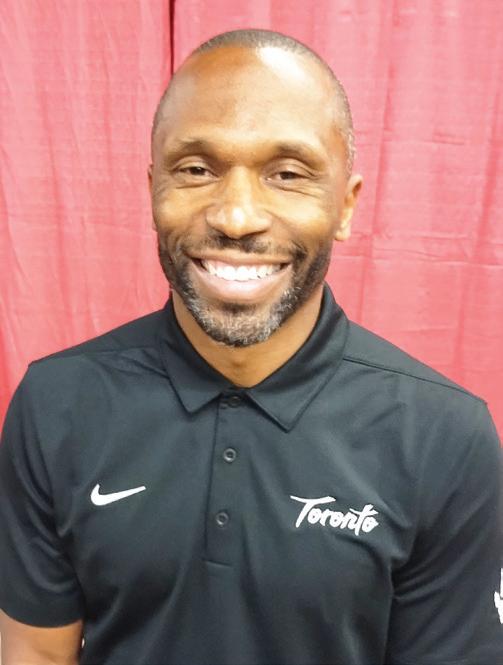
Dave Winfield honored in St. Paul
Young journalist also remembers act of kindness from baseball great
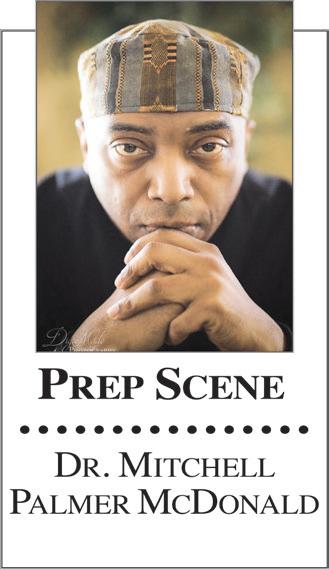
n Saturday, July 19, 2025, Major League Baseball Hall of Famer and former St. Paul Central High School and University of Minnesota baseball great Dave Winfield was honored at Toni Stone Field in St. Paul for his accomplishments on and off the field.
honor in the Hall of Fame Plaza in front of Toni Stone Field. Statues of fellow St. Paul native Major League Hall of Famers Paul Molitor (Cretin High School), Jack Morris (Highland Park Senior High), and Joe Mauer (Cretin Derham Hall High School) will follow.
Toni Stone, the St. Paulborn African American athlete and icon who excelled as a female member on men’s teams, will also have a statue in her honor.
Unable to attend the ceremony, I was reminded of a time when Winfield --- in the midst of his Hall of Fame career --- was speaking at a youth event in July 1987. The month before, I had
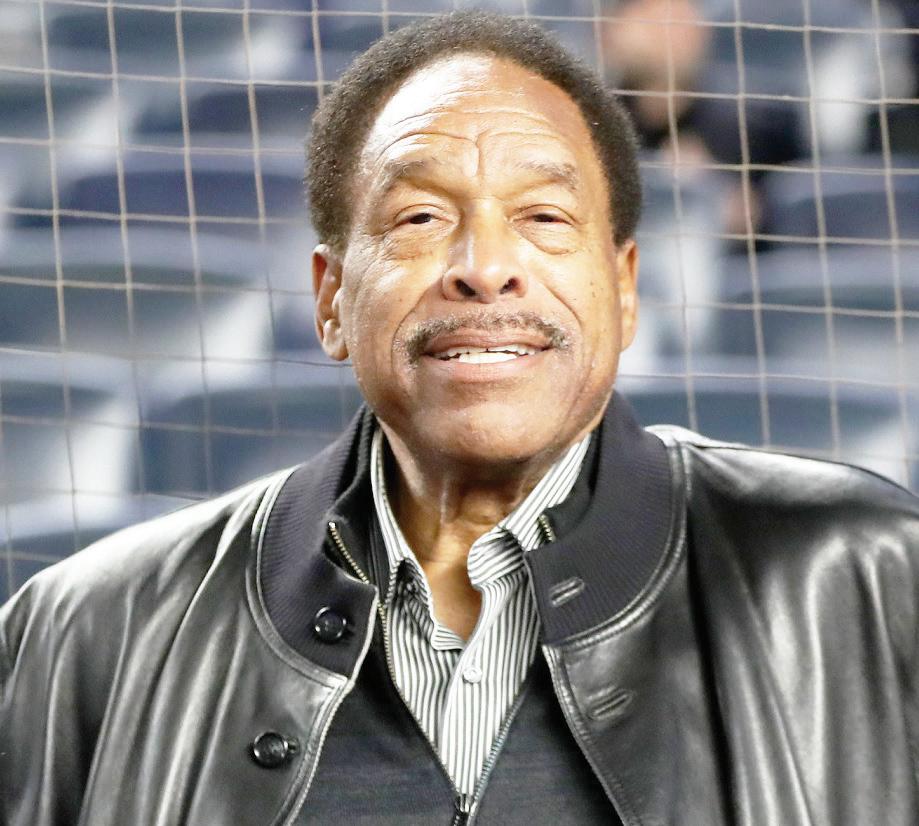
During the celebration St. Paul Mayor Melvin Carter announced that next spring a statue would be placed in his
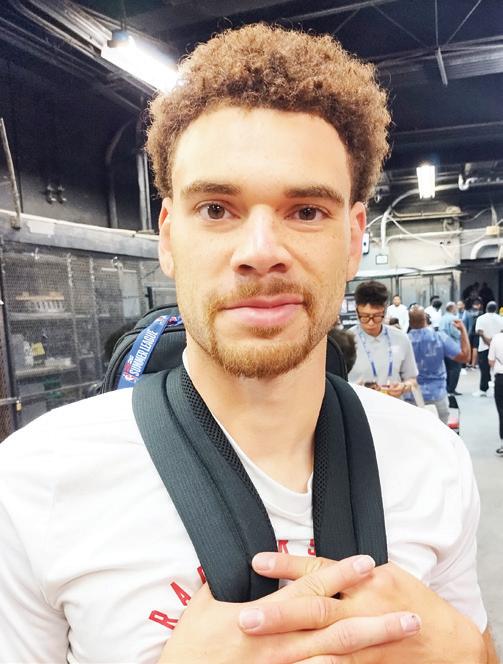
“This is year two, so I feel, not saying I’m seasoned, but I know what to expect,” Battle stressed. “I worked on my body and changed my body, and I’m trying to defend my ass off.”
Toronto Assistant Coach
James Wade, the team’s HC, added. “Jamison is doing well. He has worked his way through the mud to be a legitimate NBA player. He’s improving on the things that he doesn’t do well and on the things he does well. He’s the ultimate professional. We like the way he works.”
Garcia and Jones both went undrafted in this year’s draft.
The 6’11” Garcia, a Prior Lake High School graduate, played collegiately at Marquette (2020-21), North Carolina (2021-22), and Minnesota (2022-25). He told me the Pistons coaches have been real encouraging as he’s learning how to play pro ball.
“My time is going to come and has come,” said Garcia. “[I
am] trying to play with a lot of energy and aggressiveness.”
Jones played at Indian Hills CC (2020-21), Buffalo (202123), and Iowa State (2023-25) after he played his prep ball at Minnesota South and CretinDerham Hall.
“I was 5’7”, a little guy at South. I went to Cretin and grew up more. I’m grateful for every place I was,” said the 6’5” Jones, one of nine rookies on the Denver summertime team.
Andrew Munson, who coached the Nuggets in Vegas, said he believes Jones has as good a shot as any to make the final roster later this year because he is a good shooter.
“I got to improve my handles,” said Jones.
The Vegas Summer League isn’t just for NBA hopefuls, but also a training ground for coaches hoping to improve their careers.
“It is extremely important,” said Utah HC Chris Jones, who has been a Jazz assistant since 2019, first as a video
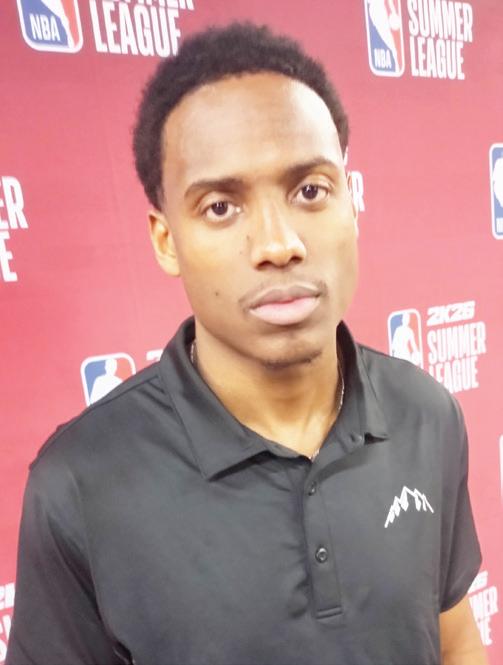
NDIANAPOLIS – The WNBA this year launched its HBCU Event Intern Program. Six students from Black colleges were brought in and worked the All-Star Weekend throughout last week leading up to and through last Saturday’s All-Star Game.
These interns “will gain behind-the-scenes access to WNBA All-Star 2025 while participating in immersive programming that includes mentorship, professional development, and networking with WNBA leaders across departments,” said a league release.
“I was born and raised in Boise, Idaho. Growing up there, you do not see Black women at all.”
The new program is sponsored by Mielle, a Blackowned natural hair care company that entered into a multi-year partnership with the WNBA in 2023.
“We are super excited about our new HBCU Interns program,” said Colie Edison, the WNBA’s first-ever chief growth officer. “This is a real unique opportunity for HBCU students and graduates to get internships through the
By Charles Hallman Sports Columnist
NDIANAPOLIS – The In-
diana Convention Center was listed under “Hot Spot Specifics” on the WNBA AllStar listing of events. During the five-day span, the building housed both WNBA LIVE and the Indiana Black Expo (IBE) Summer Celebration.
While there was a general admission cost to attend WNBA-related activities, the Expo, which began July 10, was mainly free and featured a film festival, business and education conferences, a health fair, a music festival, a gospel explosion, a Cultural Arts Pavilion, and a health and wellness basketball clinic for fathers and daughters.
Was it coincidental that both events were planned for the same time, with the twoday scheduled WNBA event connected with the All-Star Game threatening to overshadow the Black-themed Expo?
“I don’t believe it’s a coinci-
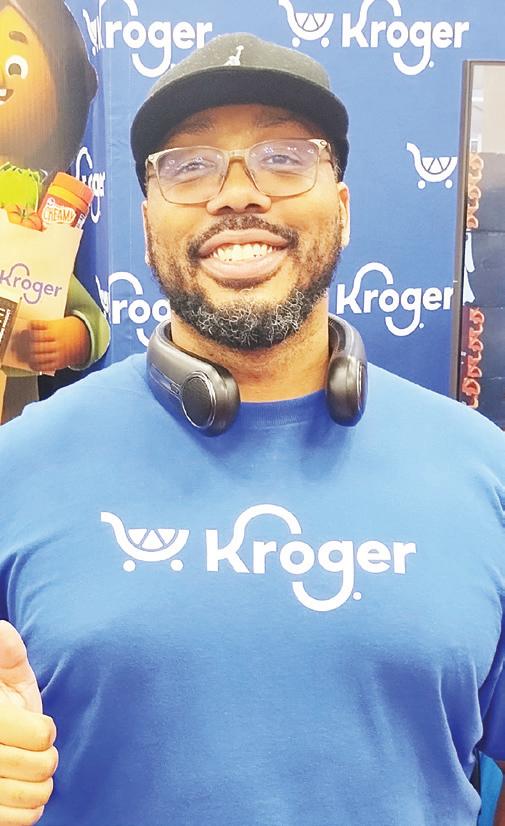
dence,” said Erin Brunson of Kroger, one of the many local vendors that had a booth at IBE. The Expo “is nothing new. It’s been established over 50 years,” he pointed out.
The IBE website says it was established in 1970 as “an effective voice & vehicle for the social and economic advancement of African-American youth and families.” The Summer Celebration is among several events that it sponsors during the year.
“The Lynx’s grade for the first half of the season was an A-minus.”
Pacers Sports & Entertainment manages the NBA’s Pacers and the WNBA’s Fever and the downtown arena they play in, along with a nonprofit organization that supports youth and community initiatives in Indiana. A spokesperson told the MSR that they often work with the Black community: They sponsored last Friday’s IBE corporate luncheon that honored broadcaster and retired WNBA player Chiney Ogwumike, actors Wendell Pierce and Alfre Woodard, and singer Deniece Williams.
“I think it’s for real,” surmised Brunson on Pacers Sports and other city-based organizations involving the Black community in such large events as last weekend’s AllStar Game. “I think they do a good job reaching out.”
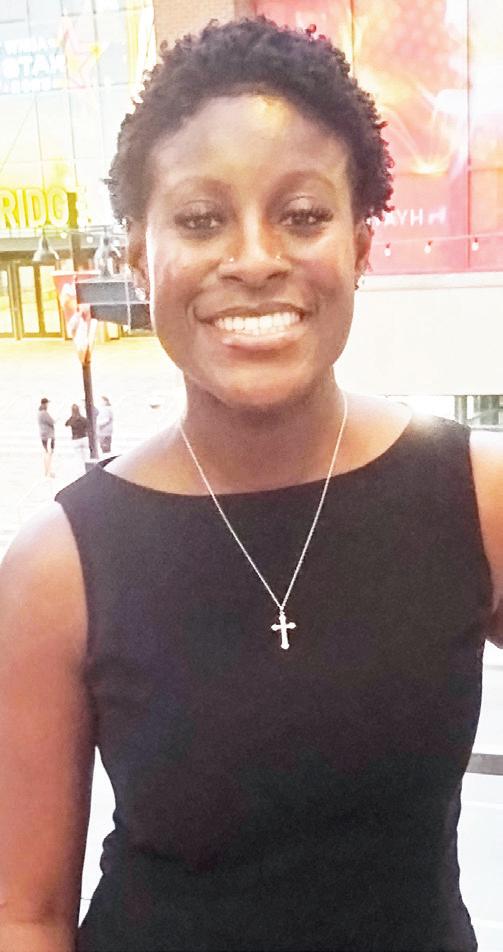
WNBA.” Asked if there have been any effects from the presidential executive orders signed against diversity initiatives since January, Edison pledged, “When you think about inclusion, it is at the core fabric DNA of what we are in the WNBA. This program brings this to life, and we will never abandon that purpose.”
Beverly Robertson is a senior at Howard studying broadcast journalism. She spoke to the MSR last Thursday. “I transferred to Howard in the fall of ’23,” said Robertson, who grew up in Boise,
The MSR once again was the only Minnesota media in attendance covering the annual WNBA mid-season classic. “Charles, you have been holding up for a number of years,” said Minnesota Lynx and All-Star HC Cheryl Reeve. “For you to come to these tentpole events, you are doing what the local media should be doing. They should be here.
Thank you for making the investment to be here.”
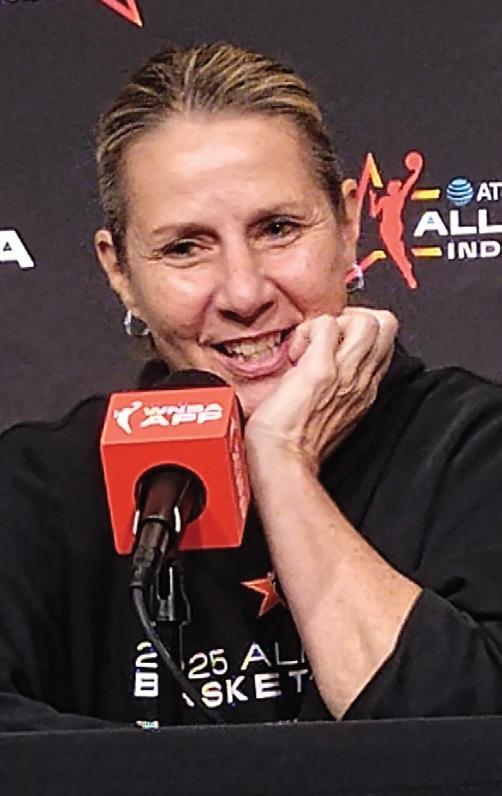
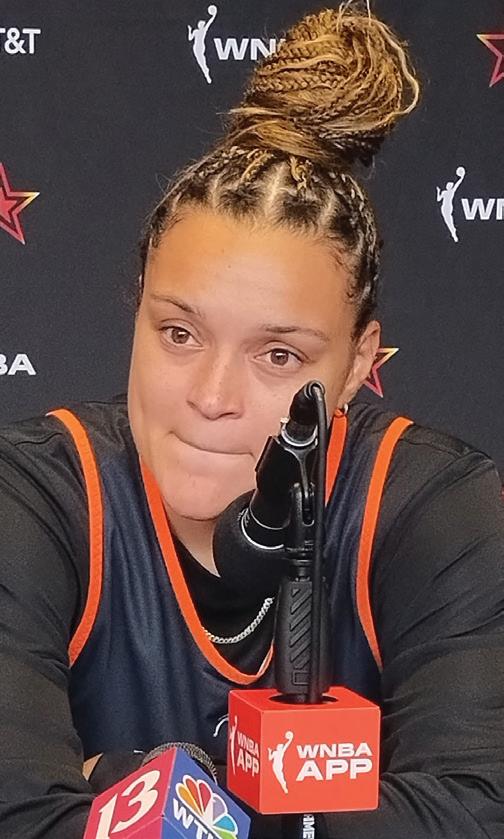
The WNBA’s second half of the season began Tuesday — Minnesota is 20-4 and leading the league. “The grade for the first half was an A-minus,” guard Kayla McBride told me last week. “We have a lot of work to do. We had a tough stretch of games to finish out the first half of the season. I’m excited for the second half.”
An estimated 40 players met last week with league officials over the CBA negotiations. Reportedly it didn’t go well.
“We will continue to push for everything that we earned,” New York’s Natasha Cloud told reporters, including the MSR, last Friday when a reporter asked about the meeting. “The word ‘earned’ should be something highlighted. Sometimes I think our intelligence is insulted in a lot of ways.

“We are more than just basketball players,” Cloud stressed. “We understand economics and business models. We understand exactly where this league is heading. There has to be a common ground, but what’s been presented is a slap in the face.
“This is a very pivotal moment,” concluded the veteran player. “I think we have a huge,